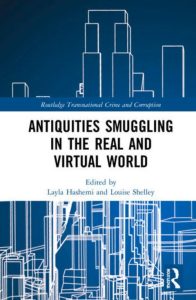
Click on a specific year to jump to past events
2023 | 2022 | 2021 | 2020 | 2019 | 2018 | 2017 | 2016 | 2015 | 2014 | 2013 | 2012 | 2011 and Earlier
2025
April 4, 2025
The National Security Law Journal & the National Security Institute Present:
THE WAR ON NARCOTERRORISM: IS THE WAR ON DRUGS BECOMING THE WAR ON TERROR?
AGENDA
12:00 PM: Check-in
12:25 PM: Opening Remarks by Annalise Emons
12:30 – 1:30 PM: Panel Discussion
1:30 PM: Closing Remarks from Brittney DePoto
PANEL
Speakers
Dennis Fitzpatrick is a decorated national security attorney and litigator who has been recognized for leading difficult and highly sensitive cases over a 20-year government career. He concluded his government service leading the investigation and prosecution of Alexanda Kotey and El-Shafee El Sheikh, two leaders of the Islamic State unit responsible for the abduction and murder of U.S. journalist sand humanitarian aid workers. Professor Fitzpatrick has worked with nearly every government agency over the course of his career.
Guadalupe Correa-Cabrera is Professor in the Schar School of Policy and Government, and co-director of the Terrorism,Transnational Crime and Corruption Center (TraCCC) at George Mason University. Her areas of expertise are border studies, U.S.-Mexico relations, international security, migration studies, and illicit networks. Within the area of migration studies, she is particularly interested in the phenomena of human smuggling and trafficking of migrants. She was recently Principal Investigator of a research grant to study organized crime and trafficking in persons in Central America and along Mexico’s eastern migration routes, supported by the Department of State’s Office to Monitor and Combat Trafficking in Persons.
Dr. Mahmut Cengiz is an Associate Professor and Research Faculty member at the Terrorism, Transnational Crime, and Corruption Center (TraCCC) and the Schar School of Policy and Government at George Mason University (GMU). He has extensive international field experience, having provided capacity-building and training assistance to partners across the Middle East, Asia, and Europe. Dr. Cengiz has also contributed to research projects for the Brookings Institution, the European Union, and various U.S. agencies. Dr. Cengiz is a prolific author, with six books to his name, along with numerous articles and book chapters on topics such as terrorism, organized crime, smuggling, terrorist financing, and trafficking.
Cully Stimson is Deputy Director of the Edwin Meese III Center for Legal and Judicial Studies, Senior Legal Fellow, and Manager of the National Security Law Program at The Heritage Foundation. He is a widely recognized expert in national security law, the law of armed conflict, terrorism, criminal law and homeland security. Prior to joining Heritage in 2007, Stimson served as Deputy Assistant Secretary of Defense for Detainee Affairs, where he advised Secretaries of Defense Donald Rumsfeld and Robert Gates on global detention policies and practices.
Moderator
Major Mika’il Ali is a Commandant of the Marine Corps National Legal Fellow assigned to the National Geospatial-Intelligence Agency’s Office of General Counsel, where he advises on all matters pertaining to the agency’s national security and intelligence mission, with specific emphasis on support to Combatant Commands, Intelligence Agencies, Law Enforcement, and use of Artificial Intelligence capabilities. Maj. Ali is a current member of the Scalia adjunct faculty where he teaches Constitutional Law, National Security Law, and the Covert & Special Operations Seminar. Maj. Ali is also a fellow at The Cyber and Technology Center.
About the National Security Law Journal
The National Security Law Journal is a student-edited legal periodical published twice annually at Antonin Scalia Law School at George Mason University in Arlington, Virginia. We print timely scholarship that furthers the dynamic field of national security law, including topics relating to foreign affairs, intelligence, homeland security, and national defense. Digital versions of our full issues are available online. We welcome submissions from all points of view, by both academics and legal practitioners, provided that they make significant and original contributions to the field.
About the National Security Institute
The National Security Institute’s mission is to strengthen American national security and U.S. global leadership by educating future leaders and advancing actionable solutions based on practical experience. NSI draws on the expertise of an all-volunteer group of experts who have held senior positions in the intelligence, defense, technology, and law sectors to produce research and actionable policy proposals. NSI experts have the diversity of experience, knowledge, and skills necessary to respond to the developing national security threat landscape, ensuring that its work is timely, fact-based, and geared towards informing and impacting policymakers in a way that works for them.
2023
March 27-28, 2023
GMU-NSF Conference on Disrupting Operations of Illicit Supply Networks
Conference Program
The conference provided opportunities to discuss future research directions in the area of illicit supply networks and promote further collaborations among the participants including:
- Principal Investigators and other investigators of the NSF: D-ISN grant awardees
- Selected researchers working in the field
- Relevant NSF program directors
- Government officials working in the area of national security
- Representatives from other relevant policy and business institutions and research centers
Location
3351 North Fairfax Drive, Arlington VA, 22203
1st Floor, Van Metre Hall (VMH), Arlington Campus, GMU
Campus Map
Conference Hotel
Hilton Arlington
950 North Stafford St. I Arlington VA 22203
Ballston Metro Station
The hotel is about a 15 minute walk to the conference at GMU Mason Square-Van Metre Hall (formerly called Arlington Campus) or a 2 block walk from the Virginia Square Metro Station (1 stop from Ballston).
Restaurant Information
Though there was no pre-planned dinner for Monday evening March 27th, we encouraged you to self-organize group dinners at local restaurants. To assist in picking out restaurants, we assembled a list of possibilities that are open on Mondays here; https://docs.google.com/spreadsheets/d/1HZo5fYivNop0CshB5O9KDvovSjsM5d4dMktfzW_ir8c/edit?usp=sharing
Topics
- Human Trafficking
- Arms/Drug Trafficking
- Antiquities/Wildlife/Organ Trafficking
- Pharmaceutical and Other Counterfeit Product Trading
- Financial Fraud/Money Laundering
- Cybersecurity/Darknet Trading
PROGRAM
Day 1. March 27 (8:00 AM – 4:30 PM)
8:00 AM – 9:00 AM
Breakfast (Multipurpose Room)
8:30 AM – 8:40 AM
Opening Remark (Dr. Hadi El-Amine, SEOR/GMU) (Multipurpose Room)
8:40 AM – 9:00 AM
Welcoming Remark & Awardees Introduction (Dr. Georgia-Ann Klutke, ENG/NSF) (Multipurpose Room)
9:00 AM – 9:45 AM
Keynote Speaker 1: Dr. Mark Shaw (Multipurpose Room)
Director, Global Initiative
Title: The Evolving Response to Organized Crime
10:00 AM – 11:30 PM
Sessions 1: Four Concurrent Sessions (See Session Information below for rooms)
Session 1A: Human Trafficking (Room: Multipurpose 125/126)
Moderator/Rapporteur: Lauren Damme, U.S. Department of Labor
- Sex Trafficking
- Labor Trafficking
Session 1B: Other Trafficking (Room: 113)
Moderator/Rapporteur: Mark Shaw, Global Initiative
- Arms Trafficking
- Drugs Trafficking
- Antique Trafficking
- Wildlife Trafficking
- Organ Trafficking
Session 1C: Illicit Trading and Dark/Deep Web (Room: 121)
Moderator/Rapporteur: Alan Bersin, Altana.ai.
- Pharmaceutical Counterfeit Product Trading
- Other Counterfeit Product Trading
- Dark/Deep Web Trading
Session 1D Illicit Financial Transaction & Cybersecurity (Room: 466)
Moderator/Rapporteur: Arion Cheong, Stevens Institute of Technology
- Financial Fraud
- Money Laundering
- Cybersecurity
11:30 AM – 12:30 AM
Greeting from Dr. Shehu, Amarda / Dr. Kamaljeet Sanghera
The Institute for Digital InnovAtion (IDIA)/GMU)
D-ISN Awardee Poster Session – Part I (Multipurpose Room)
12:30 PM – 1:30 PM
Lunch (Poster Session – Part I cont’d.)
1:45 PM – 3:15 PM
Sessions 2: Four concurrent Sessions (See Session Information below for rooms)
Session 2A: Human Trafficking (Room: Multipurpose 125/126)
Moderator/Rapporteur: Tina Faulkner, U.S. Department of Labor
- Sex Treafficking
- Labor Trafficking
Session 2B: Other Trafficking (Room: 113)
Moderator/Rapporteur: David Thompson, Altana.ai.
- Arms Trafficking
- Drugs Trafficking
- Antique Trafficking
- Wildlife Trafficking
- Organ Trafficking
Session 2C: Illicit Treading and Dark/Deep Web (Room: 121)
Moderator/Rapporteur: Peter Swartz, Altana.ai.
- Pharmaceutical Counterfeit Product Trading
- Other Counterfeit Product Trading
- Dark/Deep Web Trading
Session 2D: Disseminating your Work: Best Practices to Broaden Impacts and for Media Outreach (Room: 466)
Moderator/Rapporteur: Buzz McClain, GMU
3:15 PM – 3:45 PM
Coffee & Refreshment
3:45 PM – 04:30 PM
Keynote Speakers 2: Dr. Alan Bersin1 & Dr. Peter Swartz2 (Multipurpose Room)
1Former Commissioner of U.S. Customs and Border Protection; and DHS Assistant Secretary of Policy and International Affairs and Chief Diplomatic Officer; Senior Fellow at Harvard’s Belfer Center; and Executive Chairman of Altana.ai.
2Co-Founder and Chief Science Officer of Altana.ai
Title: Globalization 2.0, Supply Chain Visibility and The Challenges of Countering Transnational Illicit Trade
4:30 PM
Adjourn
Day 2. March 28 (8:00 AM – 2:00 PM) – All events in Multipurpose Room
8:00 AM – 9:00 AM
Breakfast
09:00 AM – 09:45 AM
Keynote Speaker 3: Ms. Delphine Schantz (on behalf of Dr. Jean-Luc Lemahieu, UNODC)
Director, New York Office, UNODC
Title: Illegal Economy and Illicit Financial Flows: Key Challenges and Measurement Perspectives
09:45 AM – 10:00 AM
Group Discussion Preparations
10:00 AM – 11:00 AM
Group Discussion
Group discussion to prepare a summary report for each theme (A-D) based on the Day 1 sessions
11:00 AM – 12:00 PM
Coffee & D-ISN Awardee Poster Session – Part II
12:00 PM – 1:00 PM
Box Lunches & Wrap-up Session
Remark by Dr. Susan Margulies, Assistant Director, ENG/NSF
The designated facilitators from each theme (A-D) will share the discussion results with all the participants and discuss future steps in addressing each issue.
1:00 PM – 1:45 PM
Keynote Speaker 4: Dr. Michaëlle De Cock
Head, Research and Evaluation Unit, ILO-FUNDAMENTALS
Title: “why is solid research critical to combat forced labour and trafficking in persons?”
1:45 PM – 2:00 PM
Closing Remark (Dr. Georgia-Ann Klutke, NSF)
2:00 PM
Adjourn
Organizers
Prof. Hadi El-Amine, College of Engineering and Computing, George Mason University
Prof. Naoru Koizumi, Schar School of Policy and Government, George Mason University
Sponsor:
The Operations Engineering (OE) program / The National Science Foundation (NSF)
GMU Co-Sponsor
The Criminal Investigations and Network Analysis Center (CINA)
The Institute for Digital InnovAtion (IDIA)
The Terrorism, Transnational Crime and Corruption Center (TraCCC)
The Center for Biomedical Science and Policy (CBSP)
March 7, 2023
Disrupting Hubs of Illicit Trade: Policy Recommendations and Industry Solutions
This virtual event was the third in a series of webinars from the Hubs of Illicit Trade (HIT) project that focuses on four hotspots (Dubai, Central America, the Argentina-Brazil-Paraguay tri-border area, and Ukraine) and different types of illicit trades, including natural resources, counterfeits, excise goods, drugs, arms, and human trafficking. Not only does illicit trade have enormous impacts on government revenues and the well-being of society, but it also negatively affects legitimate businesses across all industries and sectors. This panel discussion launched a multi-sector dialogue to address criminal convergence and commonalities across hubs of illicit trade. A new cross-sector approach is critical for disrupting these hubs by tackling their interconnected nature and finding points of convergence between the most affected industries. The webinar panelists discussed their innovative cross-cutting work in this area, focusing on best practices, industry solutions, and good examples of joint initiatives to combat illicit trade. This discussion also provided new insights into policy recommendations and helped enhance our understanding of the common issues and challenges facing the public and private sectors. Addressing these issues together is key to effectively disrupt hubs of illicit trades at the global and regional levels.
Speakers
Monica Ramirez: Global Director, Corporate Affairs, Regulatory and Public Policy
Jerry Cook: VP Government and Trade Relations, HanesBrands, Inc.
Adrian Cheek: Threat Researcher and former UK Law Enforcement Officer
DATE: March 7, 2023
TIME: 10:00 AM to 11:30 AM, EST
Click here for the slide deck
Click here for the video
February 9, 2023
Summit for Democracy (S4D) Working Group (WG) on Kleptocracy and Illicit Finance Dialogue
Date: February 9, 2023
Time: 8:45 AM to 12 PM, EST
Click here for the program and here for the flyer.
Click here for the video.
Click here for the TraCCC-AITI Co-Chairs’ Statements.
Click here for the Final Report.
Dialogue II: Investigating and Prosecuting Kleptocrats and Complicit Enablers
Co-Hosted: TraCCC-AITI, Brookings Institution, Coalition for Integrity
Opening Keynote Session:
- Brendan T Boundy, U.S. Deputy Coordinator for Global Anti-Corruption, Department of State
- Ambassador Norm Eisen (Ret.), Co-Chair, S4D Democracy Cohort for Financial Transparency and Integrity, Brookings Institution
- Dr. Louise I Shelley, Director, Terrorism, Transnational Crime and Corruption Center (TraCCC), George Mason University
Chair: David M. Luna, Co-Director, Anti-Illicit Trade Institute (AITI), TraCCC, GMU
Session 1: Strengthening Cooperation to Investigate Kleptocracies and Seizing Assets
Moderator: Jim Wright, AML Instructor; Former Financial Advisor, U.S. Treasury OTA
Panelists:
- Debra LaPrevotte, Senior Investigator, The Sentry; Former Supervisory Special Agent, Federal Bureau of Investigation (FBI), DOJ
- David Lewis, Former Executive Secretary, Financial Action Task Force (FATF), Managing Director, Global Head of AML Advisory, Forensic Investigations and Intelligence, Kroll
- Drew Sullivan, Co-Founder and Publisher, Organized Crime and Corruption Report Project (OCCRP)
Session 2: Judicial Action, Information-Sharing and Prosecutions
Moderator: Jonathan J. Rusch, Director, U.S. and International Anti-Corruption Law Program and Adjunct Professor, Washington College of Law American University; Former Federal Prosecutor, Fraud Section, Criminal Division, U.S. Department of Justice
Panelists:
- Mary Butler, Chief of the International Unit of the DOJ Money Laundering and Asset Recovery Section, U.S. Department of Justice
- Jeffrey Coleman, Supervisory Special Agent, FBI (assigned to the International Anti-Corruption Coordination Centre)
- Tess Davis, Executive Director, Antiquities Coalition
Session 3: Defending the Defenders and Collective Action
Moderator: Shruti Shah, President & CEO, Coalition for Integrity
Panelists:
- Jen Lewis, Deputy Executive Director, Anticorruption Task Force, USAID
- Samantha Feinstein, Government Accountability Project
- Gypsy Guillén Kaiser, Committee to Protect Journalists
- Khadija Sharife, Senior Investigator, OCCRP
Discussion and Closing Session
Chair: Dr. Layla Hashemi, TraCCC, GMU Strategic Observation and Intervention by Frank Vogl, Board Chair, Partnership for Transparency Fund (PTF)
2022
November 30, 2022
Hubs of Illicit Trade: Crime Convergence and the Enabling Environment
Across today’s economies, supply chains, and online marketplaces, illicit trade remains a pernicious threat that has enormous costs for governments, businesses, and communities. A significant proportion of the trafficking in illicit goods and contraband can be traced to an interlinked network of routes, financial safe havens, and trade hubs that not only enable illicit economies, corruption, and money laundering, but also help fuel greater insecurity and instability across borders. Based on our new research on illicit trade hubs in Dubai, Central America, and the Tri-Border Area (Brazil/Argentina/Paraguay), this event used case studies to examine the impacts of crime convergence and the enabling environment on the facilitation of illicit trade and new criminal threats that multiply harms across regions.
Speakers
- Dr. Christian Vianna de Azevedo: Under Secretary of Justice and Public Security for Intelligence, Joint Operations and Integration, Department of Justice and Public Security in the State of Minas Gerais – Brazil
- Daniel Rico: Founder and General Director, C-Análisis
- Dr. Rashmi Singh: Associate Professor, PUC Minas, Brazil; co-founder and co-director, Research Network on Terrorism, Radicalization and Transnational Crime (TRAC); Coordinator, Laboratory for Research and Projects in International Relations, PUC Minas
- Dr. Yulia Krylova: Research Scholar, TraCCC; Data Analyst, World Bank Group
Jorge Lasmar (moderator): Dean of Post-Graduate Studies, Professor of International Law, Faculdades Milton Campos, Brazil (Moderator) - Dr. Jorge Lasmar (moderator): Professor, PUC Minas, Brazil; co-founder and co-director TRAC; CEO Agama BT; Director of Legal Affairs of the International Association for Security and Intelligence Studies (INASIS), Regional Coordinator of the Terrorism Research Network (TRI)
TIME: 10:00 AM to 11:30 AM, EST
For more information about the project, see our Hubs of Illicit Trade page.
November 5, 2022
Public Policy Hackathon
George Mason University’s Terrorism, Transnational Crime and Corruption Center (TraCCC) is pleased to have partnered with Amazon to co-host the 2022 Bring Down Counterfeiting Public Policy Hackathon. Additionally, there was a hackathon Launch Event on Saturday, August 27, from 11am to 12pm.
Annually, counterfeiting and piracy are a $464 billion problem, or 2.5% of global trade, according to the OECD. Counterfeiters deprive brand owners of the value of their intellectual property, compete unfairly with honest entrepreneurs, and may place the health and safety of consumers at risk. Additionally, counterfeiting may intersect with other nefarious activity such as illicit trafficking in narcotics, arms, persons, and wildlife. The methods counterfeiters use and the channels they aim to exploit continue to evolve, and there is wide variability in the investments and impact that different industry stakeholders are having to prevent counterfeiters.
Organized by Blue Clarity, Bring Down Counterfeiting challenged teams from U.S. academic institutions, companies, and other affiliations to develop innovative ideas to improve public-private collaborations in the United States against the industry-wide, global challenge of counterfeiting. The final round of the public policy hackathon was held in-person on November 5th, when teams competed for more than $20,000 in prizes.
LAUNCH EVENT: August 27th, 2022 (11am to 12pm)
COMPETITION DEMONSTRATION DAY: November 5th, 2022
MORE INFORMATION: CLICK HERE
Bring Down Counterfeiting 2022 Highlights from Blue Clarity on Vimeo.
August 22-26, 2022
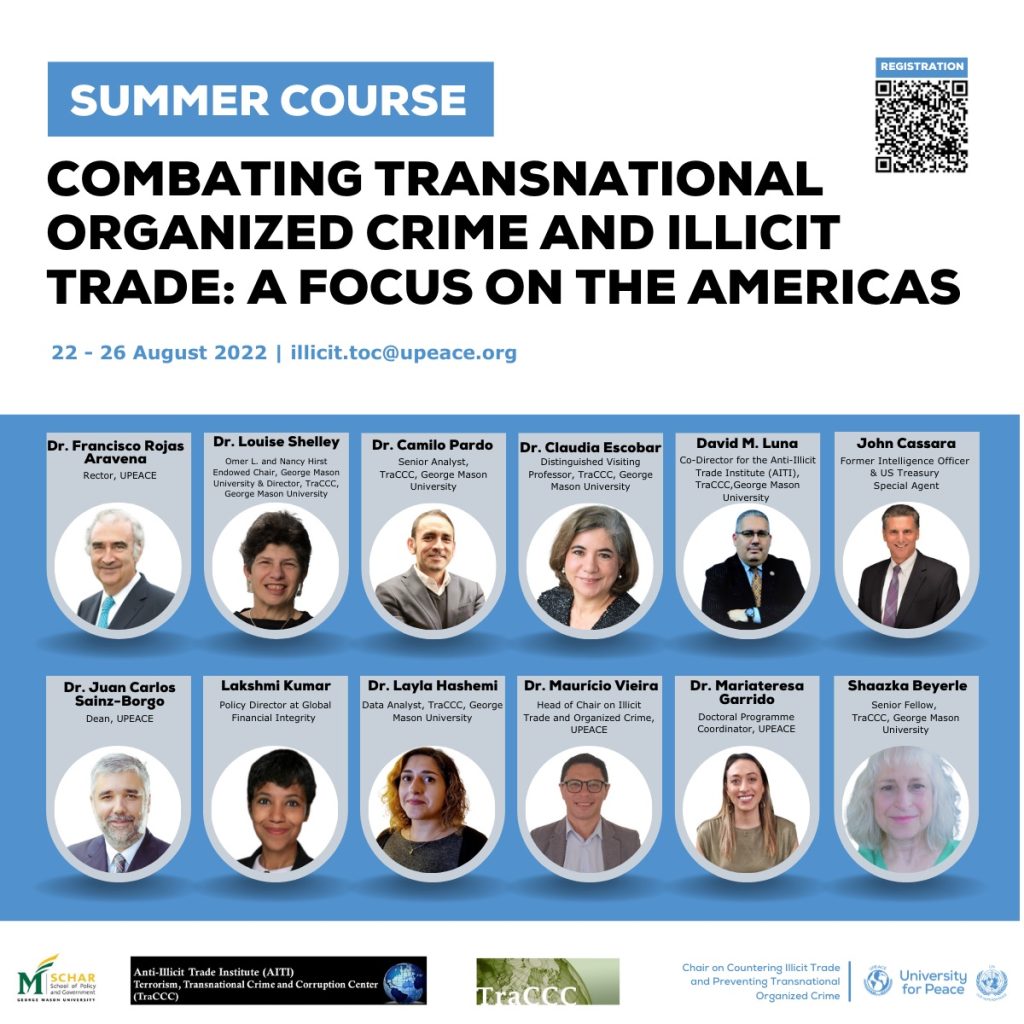
COURSE NAME: Combating Transnational Organized Crime and Illicit Trade: A Focus on the Americas
COURSE DATE: August 22 – August 26, 2022
WHERE: Virtual
TraCCC and the AITI were excited to offer a new summer course, jointly hosted by UPEACE & TraCCC-AITI, on Combating Transnational Organized Crime and Illicit Trade: A Focus on the Americas, which was be taught in English by security experts from both the region and Washington, D.C.
The 1-week innovative certificate course took place virtually from the 22nd to the 26th of August 2022
Course Overview
The course aimed to improve students’ comprehension of the dynamics of transnational organized crime by focusing on money laundering, corruption, illicit trade, security, free trade zones, state fragility, and the UN Sustainable Development Goals (Agenda 2030).
The main objective of the course was to identify how different types of crime impact the capacity of the state to manage and mitigate internal and external threats. The course also pushed participants to think about organized crime from a more nuanced perspective, specifically as an aspect of social conflict, emphasizing that the challenges for promoting peace are embedded in local, regional, and global contexts.
Course Schedule
Day 1
Session 1: Opening Ceremony and Course Introduction
Day 2
Session 2: Transnational Organized Crime Groups Business Elites
Session 3: Following Dirty Money and Value Trails
Session 4: Counterfeits and Illicit Trade
Day 3
Session 5: State Fragility and Organized Crime
Session 6: SDG 16 and Corruption
Session 7: Environment and Organized Crime
Day 4
Session 8: Free Trade Zones (FTZs) and Illicit Economies
Session 9: New Trends in Transnational Organized Crime
Session 10: Team Building Activity
Day 5
Session 11/12: Group Presentations/Joint Staff Discussion/Closing
June 14, 2022
Hubs of Illicit Trade–Launch Meeting
TraCCC held a meeting for the launch of a new project, Hubs of Illicit Trade, which seeks to better understand illicit trade, and the hubs that represent an outsized portion of that activity. Dr. Louise Shelley led our global team of experts and researchers in a discussion of the issue and this exciting project. Among the questions we hope to answer with this project are:
WHY are hubs of illicit trade becoming an increasing security concern across the international community?
WHAT are the driving factors? What are the key sectors?
WHO are the enablers? What are their tools?
WHAT has been the impact of COVID and the explosion of E-commerce? Corruption? The war in Ukraine and other violent conflicts?
And most important of all: What can we do about it? What are the right policies to counter the global enablers of hubs of illicit trade?
Date and Time
June 14, 2022
9:00 AM – 10:30 AM, EDT
Meeting was held over Zoom
April 5-May 5, 2022
Trade-Based Money Laundering (TBML) and Illicit Financial Flows: AML/CFT Controls, Countermeasures, Operations, and Practical Steps
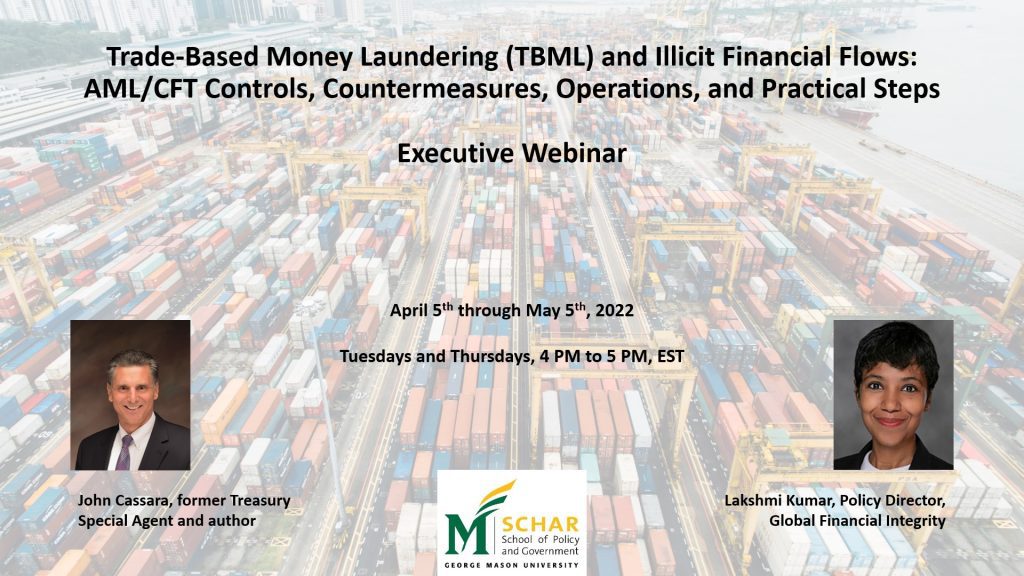
Please see the AITI Courses page for more details
March 29, 2022
A Chat with the Colombian Ambassador
Colombia and the United States established diplomatic relations on June 19, 1822. As recognized by the United States Department of State, the U.S. and Colombia share a commitment to promoting security, prosperity, and democratic governance in Colombia and across the Western Hemisphere.
TraCCC and CSPS held an in-person event, with the Colombian Ambassador to the U.S., Juan Carlos Pinzón, to commemorate the bicentennial of diplomatic relations between the U.S. and Colombia. Ambassador Juan Carlos Pinzón spoke about the countries’ binational relationship, partnership, and political challenges that both countries face. These remarks were followed by discussion with experts Dr. Camilo Pardo-Herrera and Professor Ellen Laipson, and Q&A featuring the Ambassador focused on the defense of democracy, migration, climate change, corruption, conflict and more.
Date and Time
March 29, 2022
5:00 PM to 6:30 PM, EDT
Auditorium, Van Metre Hall
Click here to see the slides
Click here to see the recording (Part 1 and Part 2)
Part 1
Part 2
March 8, 2022
Targeting Russian Oligarchs, Featuring: Tom Firestone
TraCCC and the Anti-Corruption Advocacy Network (ACAN) were pleased to host Tom Firestone, with his decades long experience on Russian law, crime, and corruption to speak about several timely topics including:
- What we can expect from the new DOJ task force
- Legal basis for seizing oligarchs’ assets under IEEPA/sanctions and U.S. anti-money laundering laws
- Opportunities for oligarchs to challenge seizure orders in court
- What U.S. businesses need to be thinking about now
About the Speakers
Tom Firestone is a partner at the law firm Stroock & Stroock & Lavan, where he co-chairs the White Collar Defense and Investigations practice. He previously spent 14 years with DOJ both as an Assistant U.S. Attorney in the Eastern District of New York, where he specialized in the prosecution of Russian organized crime, and also as the DOJ Resident Legal Adviser at the U.S. Embassy in Moscow.
Dr. Louise I. Shelley (Moderator), Director, Terrorism, Transnational Crime, and Corruption Center, and Professor, Schar School of Policy and Government, George Mason University
Date: Tuesday, March 8th, 2022
Time: 10:00 AM – 11:30 AM
Location: Zoom
View the slides from the presentation
February 21, 2022
TraCCC Book Launch: Antiquities Smuggling in the Real and Virtual World
TraCCC hosted a virtual book launch, which featured the distinguished authors for a discussion of the recently released volume, Antiquities Smuggling in the Real and Virtual World followed by a Q&A session. The book examines the illicit trade in antiquities, a trade which has increased dramatically following the destruction and looting of ancient Near Eastern sites in the Middle East. Focusing on the distribution networks for looted antiquities, especially the routes to the West, the book considers the dealers and facilitators who are key in getting the objects to market, explores the methods used including online marketplaces and social media sites, analyzes demand and buyers, revealing that objects are often available at very affordable prices. It outlines the efforts of law enforcement agencies, including the military, and legal systems to contain the trade. The book highlights the difficulties of putting a stop to this illicit trade, particularly in a conflict region.
Date and Time
February 21, 2022
10:00 AM to 11:30 AM, EST
Location: Zoom
Speakers
Dr. Louise Shelley
Dr. Layla Hashemi
Dr. Neil Brodie
Dr. Patty Gerstenblith
Dr. Ira Spar
Dr. Mahmut Cengiz
Michael Loughnane
Dr. Antonietta Catanzariti
Click here for a 20% discount on the book
2021
December 16, 2021
AML Voices:
Human Trafficking in 2021 and 2022: Recent initiatives, strategies and challenges
Louise Shelley was invited to speak on an AML Voices podcast, hosted by AML RightSource. This expert panel covered how the financial sector combats human trafficking, recent case studies and using academic research to improve due diligence to this global problem.
Speakers
Joe McNamara: Marketing Manager, AML RightSource
Dr. Louise Shelley: Director of TraCCC and Schar School Professor
Kevin Toth: AML Manager, Special Investigations Unit, Capital One
Sarah Crowe: Strategic Initiatives Director, Financial Systems, Polaris
Date and Time
December 16, 2021
1:00 PM, EST
Location: Virtual
December 8, 2021
Pathways of Crime: How Bad Actors Exploit the Internet and Payment Ecosystems to Funnel Their Wares to Consumers
Like legitimate businesses, criminal operations employ sophisticated supply chain operations to get their goods into the hands of consumers. This can include sourcing of materials, manufacturing or authentication of goods, marketing to potential customers, processing payments, and shipping to buyers. Unlike legitimate businesses, however, illicit operations often employ subterfuge and illicit pathways to avoid scrutiny from law enforcement, internet platforms, and payments companies.
In this educational session, leading experts in counterfeit personal protective equipment, problematic pharmaceuticals, and stolen antiquities shared how illegitimate actors exploit legitimate business to reach consumers. Viewers heard about both the similarities and differences in the supply chain management of various illicit operations, and learned how internet platforms and payments companies can better identify and disrupt these operations.
Date and Time
December 8, 2021
1:00 PM to 2:00 PM, EST
Location: Virtual
Speakers
Dr. Louise I. Shelley
Dr. Layla M. Hashemi
Dr. Daniel J. Rogers
For more information, click here
View the video here (TraCCC speakers represent the first 35 minutes)
December 6, 2021
Summit for Democracy–Side Event
Authoritarian States’ Illicit Finance and Kleptocracy: Threats to Democracy, Peace and Security
Overview:
The one-hour long webinar consisted of two sessions aimed at discussing possible ideas, solutions, and recommended actions to S4D and the United States and S4D communities.
Session one, The Corruptive Influence of Authoritarian States: A Kleptocracy Security Threat to Democracy and Human Rights, featured Dr. Louise I. Shelley, director of TraCCC and Claudia Escobar, former Judge of the Court of Appeals of Guatemala and a respected legal scholar. The first session was moderated by David M. Luna, Co-Director, TraCCC-AITI.
Session two, Illicit Financing of Crime, Violence, and Insecurity in Authoritarian States, featured two internationally-recognized experts and instructors of the TraCCC-AITI ongoing program on authoritarianism, John Cassara and Lakshmi Kumar, Global Financial Integrity (GFI). Session two was moderated by Dr. Layla Hashemi.
The event also featured Corina Rebegea from the National Democratic Institute (NDI).
Distinguished Panelists:
Dr. Louise I. Shelley
Dr. Claudia Escobar
John Cassara
Lakshmi Kumar
Corina Rebegea
Moderators:
David M. Luna
Dr. Layla M. Hashemi
Date and Time
December 6, 2021
12:00 PM to 1:00 PM, EST
Location: Virtual
For more information, click here
Summit for Democracy–Side Event
From High-Level Talk to Grassroots Action: How We Can Support Civic Actors to Achieve S4D Commitments
Overview:
The Terrorism, Transnational Crime and Corruption Center (TRaCCC) at George Mason University and Accountability Lab hosted a session that dove into how the Summit for Democracy commitments can be translated into meaningful, sustainable reforms on the ground through concerted civic action.
Too often, commitments at the international level by governments do not lead to change for citizens. Cutting across the Summit’s three key themes, this conversation drew on examples from around the world as to how local change-makers–with support from forward-looking funders and donors–can articulate key needs, mobilize collective action, and identify cutting-edge approaches to fighting corruption, pushing back against authoritarianism and protecting human rights. The goal was to begin a shared conversation about these issues and what a new paradigm might look like for smart, dynamic donor support for grassroots democratic actions.
Distinguished Panelists
Shaazka Beyerle: Senior Fellow, TraCCC
McDonald Lewanika: Chief of Party, Accountability Lab Zimbabwe
Fred Bauma: Activist, Lucha Congo
Abigail Bellows: Deputy, Policy, Anti-Corruption Task Force, USAID
Margaret Mliwa: Program Officer, Eastern Africa, Ford Foundation
Date and Time
December 6, 2021
9:00 PM to 10:00 PM, EST
Location: Virtual
For more information, click here
Read the S4D blog post here, co-authored by Shaazka Beyerle.
December 1, 2021
The Enablers: How the West Supports Kleptocrats and Corruption – Endangering Our Democracy
A book discussion with Frank Vogl
Overview: Authoritarian regimes in many countries, and the men that lead them, depend on the international management of licit and illicit funds under their control. The vital management services are provided by “THE ENABLERS” – banks, real estate brokers, auditors, lawyers, financial consultants, and art auction houses headquartered on Wall Street, in the City of London and in other major international financial capitals.
Frank Vogl detailed the massive scale of the activities of today’s enablers for their kleptocratic clients and why curbing their operations is critical to secure democracy, enhance national security, and ensure international financial stability.
Date and Time
December 1, 2021
12:00 to 1:30 PM, EST
Location: Remote
Speakers
Frank Vogl: Author and Presenter
Louise Shelley: Moderator
November 30, 2021
Vision Series
Louise Shelley discussed her research and the work TraCCC does on a November 30 Vision Series event from 7:00 to 8:00 PM. It was broadcast on GMU TV.
This event featured Dr. Louise Shelley, the Omer L. and Nancy Hirst Endowed Chair and a University Professor, who addressed How the Smart Use of Data Is Being Used to Fight Transnational Crime.
In her presentation, Dr. Shelley described new visionary research conducted within the Mason’s Terrorism, Transnational Crime and Corruption Center where sophisticated use of data is providing key insights into critical problems of corruption, terrorism, illicit trade, and transnational crime. She also highlighted her National Science Foundation funded team’s prize-winning basic research using advanced data analytics, which has contributed to the seizure worldwide of over 55 million counterfeit and substandard medical masks that would have otherwise endangered medical care providers.
The Mason Vision Series was live streamed through GMU-TV. Participants had the opportunity to engage in the discussion by submitting questions via email ([email protected]) or Twitter by using #VisionSeriesMason.
October 12-November 11, 2021
Transnational Crime, Money Laundering & Illicit Finance from Authoritarian States
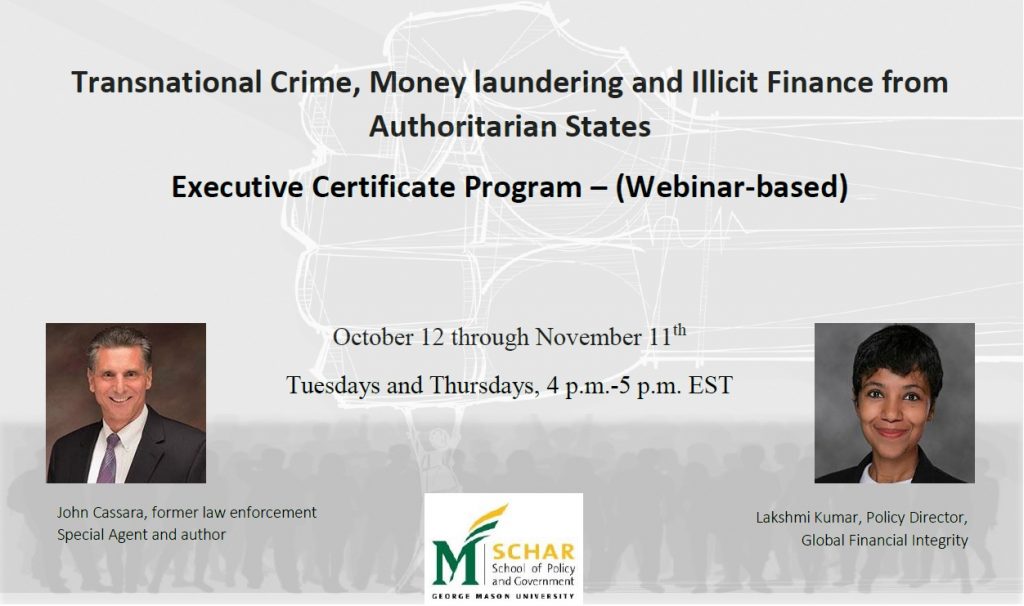
Please see the AITI Courses page for more details
October 27, 2021
Namibia: Natural Resources, Equitable Development and Corruption
Overview: Namibia, bordering the South Atlantic Ocean in Southern Africa, is rich in natural resources from diamonds and uranium to fish and zinc. Its middle-income status belies high socioeconomic inequalities and corruption, the latter from the micro level up to national and transnational dealings. TraCCC’s Community Solutions Program (CSP) Fellow, Allen Muketela, presented an overview of corruption in Namibia, including in the realm of natural resources and the impact of graft on equitable development.
Date and Time
October 27, 2021
1:30 to 3:00 PM, EST
Location: Remote
Speakers
Allen Muketela is a 2021-22 Fellow from Namibia in the Community Solutions Program (CSP), a U.S. Department of State sponsored leadership and exchange program implemented by IREX that brings early- to mid-career changemakers between 25-38 years of age and from over 90 countries. TraCCC is pleased to be Allen’s virtual CSP Practicum host. His practicum focus is on the nexus of corruption and equitable development in his country, particularly in the Zambezi region. Allen was one of the founders of a prior youth initiative, the Zambezi Anti-Corruption movement. He’s an entrepreneur and experienced facilitator and career guidance and financial literacy mentor for junior and secondary schools.
A. Alonso Aguirre: Department Chair & Professor, Environmental Science and Policy, GMU (discussant)
Shaazka Beyerle: Senior Fellow at TraCCC (facilitator)
October 14, 2021
TITLE: Will Central America be our next Afghanistan?
DATE: October 14, 2021
TIME: 12:00 – 13:30 p.m.
PANELISTS:
- Louise Shelley – Director, Terrorism, Transnational Crime and Corruption Center University Professor, Schar School of Policy and Government at George Mason University.(moderator)
- Adriana Beltran – Executive Director of Seattle International Foundation.
- Stephen McFarland – Former US Ambassador to Guatemala and Coordinator of Rule of Law and Enforcement in Kabul, Afghanistan.
- Claudia Escobar Mejía – Distinguished Visiting Professor, Schar School of Policy and Government at George Mason University. Executive Director of Be Just NGO.
OVERVIEW:
Continued instability and insecurity in Central America are destabilizing the region with some states veering towards authoritarian rule and criminalized markets. Pervasive kleptocracy, violent organized crime, and illicit economies across Central America have eroded the rule of law, stymied sustainable development, heightened poverty, diverted critical resources from financing economic growth, infrastructure modernization, and broader prosperity, while fueling an array of cross-border security threats across the region. Such actions have worsened during the pandemic and now pose greater threats to U.S. national security and international community as corrupt power elites and criminal networks contribute to surges in migration and undermine legitimate commerce, trade, and the economy through extortion, the trafficking of drugs, weapons and counterfeits, human trafficking and smuggling.
TOPICS:
The Panelists comparatively discussed the similarities and differences between the situation in Afghanistan and the countries of Central America in relation to corruption, institutional weakness (especially in the judiciary), organized crime, violence against women and human rights. The role of the international community is indispensable to help develop more effective regional security approaches and solutions. Such actions will help to prevent the region from further destabilization adverse to the interests of the United States and international community and in countering the corruptive influence of kleptocrats, organized criminals and drug trafficking networks.
October 7, 2021
Peace and Reconciliation: Issues and Challenges
Overview: Southeast Asia is home to 11 states with different political systems, history, culture, and identity. Many states in the region have faced decades-long armed conflict – some have managed to forge peace while others are still in the process of seeking it. While there appears to be relative peace on the surface, fractious divides remain in communities affected by conflict. The discussion-lecture focused on the challenges and issues involved in forging social unity and cohesion in select Southeast Asian countries.
Date and Time
October 7, 2021
10:30 AM to 12:00 PM, EST
Location: Remote
Speakers
Dr. Jennifer Santiago Oreta: Visiting Fulbright Scholar at Schar School at GMU; Assistant Professor of the Department of Political Science, and Director of the Ateneo Initiative for Southeast Asian Studies (AISEAS) of the Ateneo de Manila University, Philippines; US-ASEAN scholar under the Fulbright program at TraCCC
Dr. Al Fuertes: Professor, GMU (Facilitator)
September 30, 2021
Virtual Panel
The anti-corruption potential of beneficial ownership transparency and implications for natural resources
Overview: Beneficial ownership transparency (BOT) is emerging as an important policy tool for curbing corruption and stemming illicit financial flows – including flows connected to natural resources. Experts on this virtual panel highlighted the rapidly changing landscape around beneficial ownership regulations and the importance of beneficial ownership information for improving conservation outcomes. Panelists discussed good practices for regulation development and how collaborations with law enforcement and financial institutions can advance needed reforms.
Date and Time
September 30, 2021
9:00 AM to 10:30 AM, EST
Location: Remote
Speakers
Michele Kuruc, J.D.: Vice President, Ocean Policy, WWF-US
Elise Bean: former Staff Director & Chief Counsel, U.S. Senate Permanent Subcommittee on Investigations
Sol Krause (tbc): Crime Prevention & Criminal Justice Officer, Stolen Asset Recovery Initiative, World Bank/UNODC
Louise Russell-Prywata: Director of Policy and Programmes, Open Ownership
Dr. Louise Shelley: Director, TraCCC, and Professor at the Schar School of Policy and Government, GMU (Moderator)
For more information, click here
September 14, 2021
Virtual Panel
Trade Discrepancy Analysis: A Tool to Identify Environmental Corruption
Overview: Corruption is a significant facilitator behind illegal logging, timber laundering, and associated international trade, undermining efforts to conserve and sustainably use forest resources. Under the Targeting Natural Resource Corruption project, researchers are developing new evidence on factors that can affect the success and failure of anti-corruption interventions in the biodiversity and natural resource management space. Many joined us for a presentation of forthcoming research findings from an examination of trade data on timber to and from Vietnam, and discussion of the implications and potential applications of this and similar research. This event shared insights on how trade data is being used to “follow the money” and find discrepancies that indicate possible illicit financial flows and associated corruption.
Date and Time
September 14, 2021
9:00 AM to 10:30 AM, EST
Location: Remote
Speakers
Dr. Camilo Pardo: Researcher, TraCCC
Dr. Thomas Chung: Forests Campaigner, Environmental Investigation Agency
Hin Keong Chen: Senior Advisor – Forest Governance and Trade, TRAFFIC
Dr. Louise Shelley: Director, TraCCC, and Professor at the Schar School of Policy and Government, GMU (Moderator)
To learn more about the event, click here
September 6, 2021
The elephant in the room: Raising up corruption on the conservation agenda
Corruption is a grabbing hand that distorts good governance, undermines the sound management of natural resources, facilitates environmental crime and illegal trade, and drives resources away from the public good and into private hands. CITES and other high-level bodies are starting to raise the profile of this issue and how it effects people and biodiversity, but practitioners need a stronger understanding of the forms corruption takes, how it contributes to environmental crime, undermines our climate, harms communities, and what can be done about it. This session brought together prominent leaders in anti-corruption, finance, conservation and other sectors to assess the challenges that corruption poses and to set an agenda for the anti-corruption and conservation communities to work together more effectively to address them.
Participants heard from leading voices in anti-corruption, governance, finance, and natural resource management for solution-oriented insights on the economic, environmental and institutional costs of corruption and how the conservation community can better address root causes to improve outcomes for people and biodiversity.
Event Details
NOTE: This particular event, which was organized by TraCCC, was part of the larger IUCN World Conservation Conference, held in Marseille and shared online.
Date: September 6th, 2021
Time: 12:00 PM – 1:30 PM, EST
Location: Virtual
July 26, 2021
Webinar:
Putting a Price on the Priceless: Measuring the Illicit Antiquities Trade in Data and Dollars
Overview
This July, for the first time, the G20 came together to tackle culture —in growing recognition of the threats facing the world’s largest economies from transnational crimes via art and artifacts, including trafficking, money laundering, and criminal financing.
As heads of state and government turn a global spotlight on the illicit trade in cultural property, it is more important than ever that policymakers and law enforcement fully understand the problem. Yet, when compared with other black markets, there is still much we don’t know, and many of the available statistics on the size and scale of the illegal trade in antiquities or the dollar amount of the trade are widely contradictory. Neil Brodie, in a 2019 study for the European Commission, stated that European dealers are selling antiquities in the 54 to 318 million euro range annually and the value of antique and medieval coins sold by Europe alone totaled at least 56 million euros annually. The Manhattan District Attorney’s Office, responsible for the New York market alone, reported in 2019 the seizure of $150 million in stolen objects since its founding in 2012.
This lack of reliable statistics on the size of the market is hampering the international community’s ability to fight back. But how can we quantify looting, smuggling, and related crimes? What data sources can be used? Is absence of evidence actually evidence of absence? What harm is caused by cultural racketeering beyond a dollar amount—to the legitimate art market, global security, and human rights?
Many joined us for a stimulating discussion on these questions and more, as we brought together top experts in antiquities trafficking, transnational crime, and the art market.
Date and Time
July 26, 2021
12 PM EST (DC Time)
Location: Virtual
Watch the Webinar
June 16, 2021
Sample Class:
New Threats and Security Responses
Overview: Schar School faculty discussed the shift away from a primary focus on international terrorist organizations to a growing concern about extremist threats within the United States—and how our national security system is organized to respond. Professor Louise Shelley, director of the Terrorism, Transnational Crime and Corruption Center (TraCCC), and Professor Andrew McCabe, former Deputy Director of the FBI, led the discussion, moderated by Professor Ellen Laipson, director of the Schar School’s Master’s in International Security program and former Vice Chair of the National Intelligence Council.
Date and Time
June 16, 2021
6:00 PM, EST
Location: Remote
Speakers
Professor Andrew McCabe: Current Schar School professor and former Deputy Director of the FBI (2016-2018).
Professor Louise Shelley: Schar School professor and Director of the Terrorism, Transnational Crime and Corruption Center (TraCCC)
Professor Ellen Laipson: Director of the Schar School’s Master’s in International Security program and Center for Security Policy Studies
To learn more about the event, click here
June 14, 2021
Virtual Panel:
Sand mafias: Environmental harm, corruption, and economic impacts
Overview: TraCCC and the TNRC Project held a virtual panel discussion on sand mafias — an understudied, yet environmentally devastating trend for which corruption appears to be a major facilitating factor. The illicit extraction and trade in sand is detrimental to ecosystems and plays a role in destroying local economies, propping up autocrats and fueling conflict.
Date and Time
June 14, 2021
9:00 AM to 10:30 AM, EST
Location: Remote
Speakers
Mohamad Daghar: Regional Coordinator Eastern Africa, ENACT programme, Institute for Security Studies
Dr. Prem Mahadevan: Senior Analyst, Global Initiative Against Transnational Organized Crime
Dr. Louise Shelley: Director, Terrorism, Transnational Crime and Corruption Center, and Professor, Schar School of Policy and Government, George Mason University (Moderator)
To learn more about the event, click here
May 18, 2021
Virtual Panel:
Lessons from research: Using trade data to expose illicit financial flows and corruption in natural resource commodities, and broader applications
Overview: Corruption is a significant facilitator behind illegal logging, timber laundering, and associated international trade, undermining efforts to conserve and sustainably use forest resources. Under the Targeting Natural Resource Corruption project, researchers are developing new evidence on factors that can affect the success and failure of anti-corruption interventions in the biodiversity and natural resource management space. The TNRC Project hosted a presentation of new research findings from an examination of trade data on timber from Peru, and discussion of the implications and potential applications of this and similar research. This event shared insights on how trade data is being used to “follow the money” and find discrepancies that indicate possible illicit financial flows and associated corruption.
Date and Time
May 18, 2021
10:00 AM to 11:30 AM, EST
Location: Remote
Speakers
Camila Gianella: Researcher, CMI
Channing Mavrellis: Illicit Trade Director, Global Financial Integrity
Dr. Camilo Pardo: Researcher, Terrorism, Transnational Crime, and Corruption Center, GMU
Julia M. Urrunaga: Peru Director, Environmental Investigation Agency (EIA), (Moderator)
To learn more about the event, click here
April 6-May 6, 2021
Understanding AML/TBML to Fight Kleptocracy, Illicit Trade, and Financial Crime
Overview: This online course on Understanding Anti Money Laundering/Trade-Based Money Laundering (AML/TBML) to Fight Kleptocracy, Illicit Trade, and Financial Crime was taught by two internationally-recognized experts on Anti-Money Laundering and Counter Terrorist Financing (AML/CFT), John Cassara (former law enforcement Special Agent and author) and Lakshmi Kumar (Policy Director, Global Financial Integrity). The instruction was in “real time” where students logged in to the virtual class on Mason’s platform. Students that successfully completed this executive development webinar received a certificate from the Anti-Illicit Trade Institute of the Terrorism, Transnational Crime, and Corruption Center (TraCCC), Schar School of Policy and Government.
Instructors: John Cassara (former law enforcement Special Agent and author), Lakshmi Kumar (Policy Director, Global Financial Integrity).
Special Guest Speaker: David M. Luna, Co-Director, Anti-Illicit Trade Institute, TraCCC; Chair of Business at OECD AITEG; B20 Integrity & Compliance Task Force Member
Course Dates: April 6th, 2021 – May 6th, 2021
Time: Tuesdays and Thursdays, 4:30 pm-5:30 pm EST
Learn more about the TBML course here.
March 11, 2021
The Role of Investigative Journalism in Countering Natural Resource Corruption
Investigative journalists are often the first to uncover corruption in locations with limited enforcement or low rule of law. This is particularly true in environmental sectors that tend to be low priorities for law enforcement and governments. These professionals also bring skills and relationships to bear that can shed light on corruption in natural resource management (NRM).
TraCCC held a TNRC Virtual Panel to discuss how investigative journalists approach investigations in environmental sectors to uncover corruption, and how NRM practitioners and journalists can cooperate, inform and learn from each other, particularly in settings where corruption makes it less desirable to report to government. Experts shared their stores, experience, and best practices for being effective in spite of corrupt environments.
Learn more and see the recording here.
2020
November 10, 2020
The 24 Hour Conference on Organized Crime
On November 10th, members of TraCCC participated in sessions 8 and 9 of the 24 Hour Conference on Organized Crime. For more information please click the link.
Session 8: Disrupting Drug and Counterfeit Supply Chains
Layla Hashemi, Edward Huang, Damon McCoy, Louise Shelley
November 10th, 6:30 PM ET
Session 9: Disrupting/Analyzing the Illicit Antiquities Trade in the Real and Virtual World
Louise Shelley, Michael Loughnane, Layla Hashemi
November 11th, 2:00 AM ET
November 5, 2020
David Scheffer Addressed ICC
David J. Scheffer is visiting senior fellow at the Council on Foreign Relations (CFR), with a focus on international law and international criminal justice. Scheffer is also the Tom A. Bernstein Genocide Prevention Fellow working with the Ferencz International Justice Initiative at the Simon-Skjodt Center for the Prevention of Genocide, U.S. Holocaust Memorial Museum, as well as Clinical Professor Emeritus and Director Emeritus of the Center for International Human Rights at Northwestern Pritzker School of Law in Chicago. From 2012 to 2018 he was the U.N. Secretary-General’s Special Expert on U.N. Assistance to the Khmer Rouge Trials. He is Vice-President of the American Society of International Law.
Date: November 5, 2020
12:00 – 1:00 PM ET
October 20-November 19, 2020
Illicit Finance and Trade Based Money Laundering Executive Webinar
This course (which ran from October 20th to November 19th) provided information on understanding how money laundering works, current issues, trends, and methodologies used by today’s bad actors – once having accumulated money from an array of illicit activities – who hide, disguise, and launder so that authorities cannot determine where the dirty money comes from. The instructors shared practical insights on what works and what does not by examining effective international standards such as those by the Financial Action Task Force (FATF), AML measures, best practices, and case studies in detecting and preventing the laundering of dirty money. This course also focused on trade-based money laundering (TBML), underground financial systems, black market exchanges, new payment methods (NPMs), and other illicit finance processes, vehicles, and methods that enable bad actors to disguise and clean their dirty money.
September 29, 2020
Understanding how corruption is accelerating illegal logging and deforestation during the COVID-19 pandemic
TraCCC in our partnership with TNRC hosted a virtual panel that focused on corruption as an important facilitator of illegal logging in the Amazon ( Peru and Brazil) and Mozambique. Experts addressed COVID-19 era developments in a historical context, discussed their recent research and publications and advocated means to effectively address this crucial problem that undermines biological diversity, exacerbates climate change and often threatens forest-dependent communities. We discussed strategies to address corruption and follow the money in regard to this illicit trade.
Speakers
Maureen Moriarty-Lempke, PhD, Senior Fellow, Duke University Center for International Development and Senior Associate, Land and Security, CDA Collaborative Cambridge
Julia Marisa Sekula, Coordinator – Climate and Security, Instituto Igarapé
Julia M. Urrunaga, Peru Director, Environmental Investigation Agency (EIA)
Debra LaPrevotte, Senior Investigator, The Sentry (Moderator)
Learn more and see the recording here.
September 18, 2020
Beyond 9/11: Homeland Security and Transnational Crime Panel Discussion
What does it mean to “secure the homeland” in the twenty-first century? During this event, leading experts provided strategic lessons and crucial recommendations for the future of homeland security. This panel discussion focused on the place of counter-terrorism in the homeland security enterprise, the management of transnational crime, confronting cyber and other threats to our infrastructure, and the challenge of weapons of mass destruction.
Speaker 1: Alan Bersin, Belfer Center, Harvard “What’s Wrong with the Conventional Law Enforcement Model.”
Speaker 2: Caitlin Durkovich: “The Disruption Model for Combating Transnational Criminal Networks”
Speaker 3: Seth Stodder, Holland & Knight, “Law Enforcement Targeting: Finding the Criminal Needle in the Legal Haystack.”
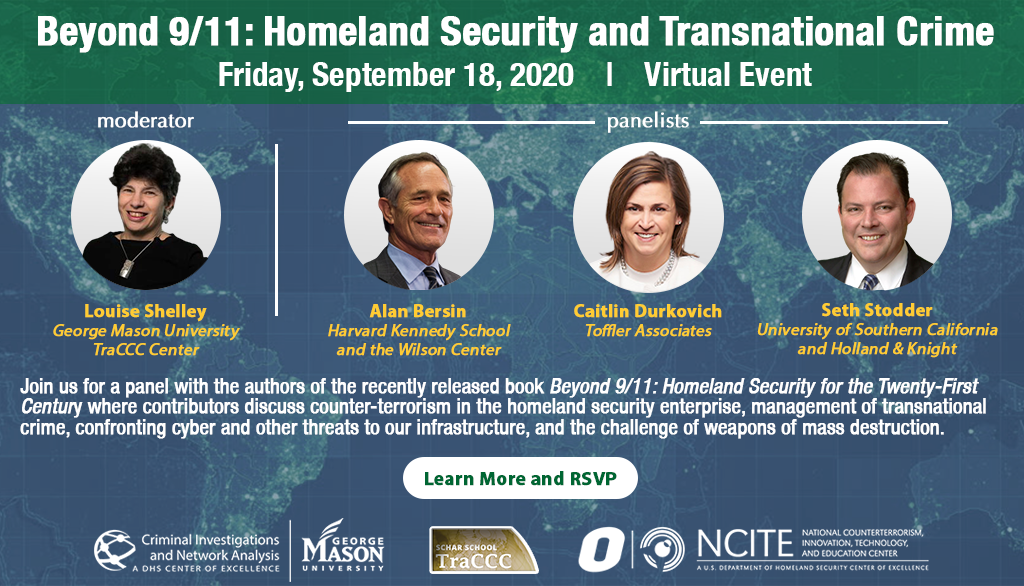
To watch the video of the event, please click here.
September 16, 2020
Female Rangers and Anti-Poaching Strategies to Stem Corruption
TraCCC, in our role with TNRC, hosted a discussion on gender as an anti-corruption strategy in the natural resource sector. Experts from the field started with and expanded upon examination of three examples of female anti-poaching units in Southern and Eastern Africa.
Panelists:
Jessica Graham, President, JG Global Advisory LLC
Greta Francesca Iori, Wildlife Crime & Conservation Consultant
Rohit Singh, Law Enforcement Specialist, WWF
Dr. Louise Shelley, Director, Terrorism, Transnational Crime and Corruption Center, and Professor, Schar School of Policy and Government, George Mason University (Moderator)
For a recap on the event and to listen to the recording please click here.
August 27, 2020
Connections between IUU fishing and corruption — and how the global community can combat them
TraCCC, in its role as a member of the Targeting Natural Resource Corruption Project (TNRC), held a discussion on global illegal, unreported and unregulated (IUU) fishing, the role of corruption in facilitating IUU fishing, and the criminality and human rights abuses often associated with it. Experts discussed regional and global perspectives for addressing this challenge.
Featuring:
Per Erick Bergh, Coordinator, Secretariat, Stop Illegal Fishing
Dr. Tabitha Grace Mallory, Affiliate Professor, University of Washington, Founder and CEO, China Ocean Institute
Ame Sagiv, Director, Forced Labor and Human Trafficking, Humanity United
Sally Yozell, Senior Fellow and Director, Environmental Security, Stimson Center
Michele Kuruc, J.D. Vice President, Ocean Policy, WWF (Moderator)
To watch the recording, click here
June 23, 2020
Virtual Panel: Illegal Wildlife Markets, Zoonotic Disease Transfer and Corruption
TraCCC’s director, Dr. Louise Shelley, participated in a virtual panel on wildlife and natural resource corruption on Tuesday, June 23rd. This virtual event examined the role that corruption has played in allowing these markets to flourish, what the future may hold if trade is driven underground, and new approaches that practitioners must consider to protect natural resources, public health and assure good governance.
March 28th and 29th 2020: Combat Human Trafficking Challenge (Virtual)
TraCCC was thrilled to host its 2nd Hackathon to combat human trafficking with our partner Blue Compass. This year’s event focused on combatting child sexual exploitation and labor trafficking.
Human trafficking is a global enterprise that is second only to drug trafficking as the most profitable criminal business. It takes many forms, including labor trafficking and sex trafficking. Participants created a solution to help combat human trafficking or assist its victims, using artificial intelligence/machine learning, augmented reality, among other things.
In the absence of physical class time, this virtual hackathon offered students the chance to engage with relevant material and continue to build their skills in a virtual environment while networking with teams from across the country. To prepare hackers for the event, the beginning of the hackathon also included training and orientation sessions from many top professionals in the field.
- Highlight Video: https://vimeo.com/406276141
- Keynote Speaker – Evelyn Chumbow: https://vimeo.com/406194386
- “Automated OSINT Collection and Analysis for Human Trafficking Use Cases” with Recorded Future: https://vimeo.com/410817316
- “The Power of Location: Using Maps for Impact” with MapBox: https://vimeo.com/410820013
- “Image Recognition with Python” with Georgetown Data Science: https://vimeo.com/405218309
- “Leveraging Technology to Serve Survivors” with UNITAS: https://vimeo.com/405153206
- “Accelerating Your Growth” with C5 Accelerate: https://vimeo.com/405194689
- “Federal Approach to Human Trafficking Investigations” with FBI: https://vimeo.com/40554073
- “How Traffickers Use Technology” with Beauty for Ashes: https://vimeo.com/410863562
- “Lessons Learned from DHS Research” with DHS: https://vimeo.com/410864518
January 27th 2020: Understanding Crime Convergence to Better Target Natural Resource Corruption
TraCCC, as part of the Targeting Natural Resource Corruption Consortium, was pleased to host a presentation by Gloria Freund “Understanding Crime Convergence to Better Target Natural Resource Corruption, followed by a panel discussion. This presentation was part of the World Bank ICCWC (The International Consortium on Combatting Wildlife Crime) Wildlife Forum.
Gloria Freund is the lead for Combatting Wildlife Trafficking at the Office of the Director of National Intelligence, and she addressed three questions: (1) How ‘real’ and prevalent is the oft-heard convergence factor within the illicit ecosystem?; (2) How can we discern where convergence occurs to make more impactful decisions to address this pernicious, corrupting activity?; and (3) What can we gain by adopting a broader, commodity-agnostic aperture in addressing natural resource exploitation?
View the video here.
2019
November 13th 2019: Sanctions and Illicit Flows
TraCCC presented a multi-organizational perspective on sanctions and why they are instituted, and how they are evaded. The diverse analytical presentations on the Middle East focused on the networks that are behind this deceptive behavior and the means used to counter this harmful activity.
Panelists described how the United States and other countries have used sanctions to prevent the proliferation of chemical weapons to Syria, deter the use of these weapons during that country’s civil war, and hold perpetrators of chemical attacks accountable. Additionally, we discussed the means by which risk actors evade sanctions and how data can protect government and corporate entities from risk exposure related to sanctions evasions networks. Case studies explored the international network and continued activities of a Syrian company linked to chemical weapons procurement, illustrating the potential for continued illicit procurement and financing, as well as how the recent indictment of the Turkish Halk Bank by the US government for evasion of sanction sheds light on illicit movement of money.
View the flyer here
October 29, 2019: Deb LaPrevotte: Following the Money in Illicit Wildlife Trade
Traccc was pleased to host Deb LaPrevotte, senior investigator with the Sentry. LaPrevotte addressed illicit wildlife trade, and its intersection with corruption and other transnational crime.
October 9 2019
Forest Legality Week: Timber Trade, Illicit Financial Flows, and Corruption
TraCCC co-sponsored a side session focusing on natural resource corruption (TNRC project) as part of WRI’s Forest Legality Week. The panel was led by TraCCC’s Kasey Kinnard and included Camillo Pardo (TraCCC), Bruce Zagaris, Susanne Breitkopf (Environmental Investigation Agency), and Mary Utermohlen (C4ADS).
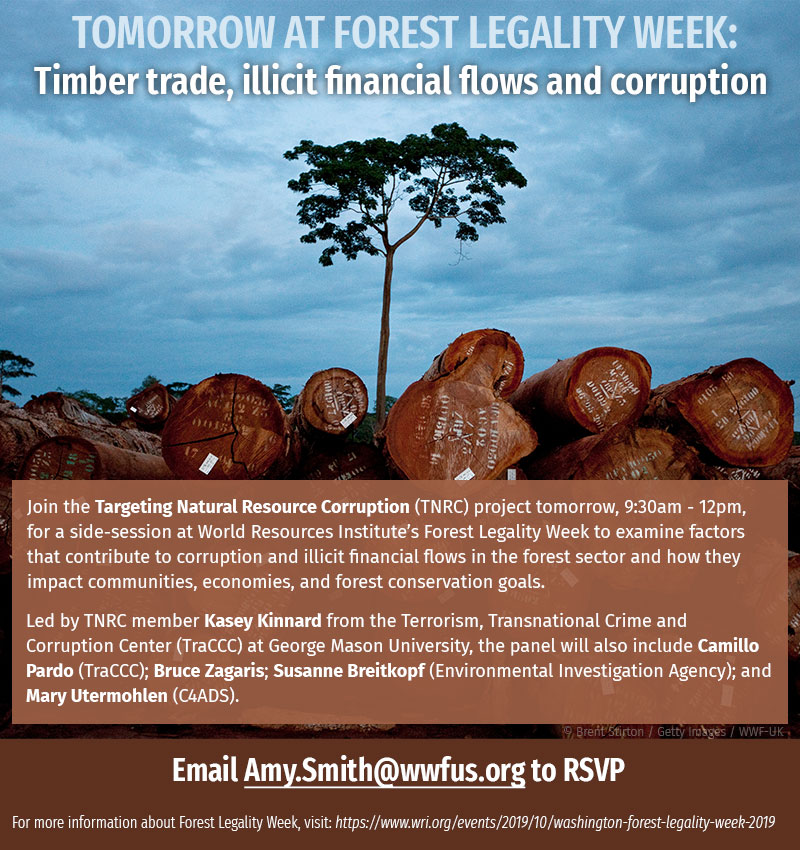
October 7 2019
How We Win: How Government Officials and Concerned Citizens Can Counter the Extremist Threat
The National Security Institute, (NSI) Center for Security Policy Studies (CSPS), and the Terrorism, Transnational Crime and Corruption Center (TraCCC) hosted a conversation with NSI Advisory Board Member Farah Pandith on her newest book, “How We Win.” The book lays out a comprehensive strategy for entrepreneurs, government officials, and concern citizens on how to counter against violent extremism. Jamil N. Jaffer, NSI Founder and Executive Director, interviewed Ms. Pandith.
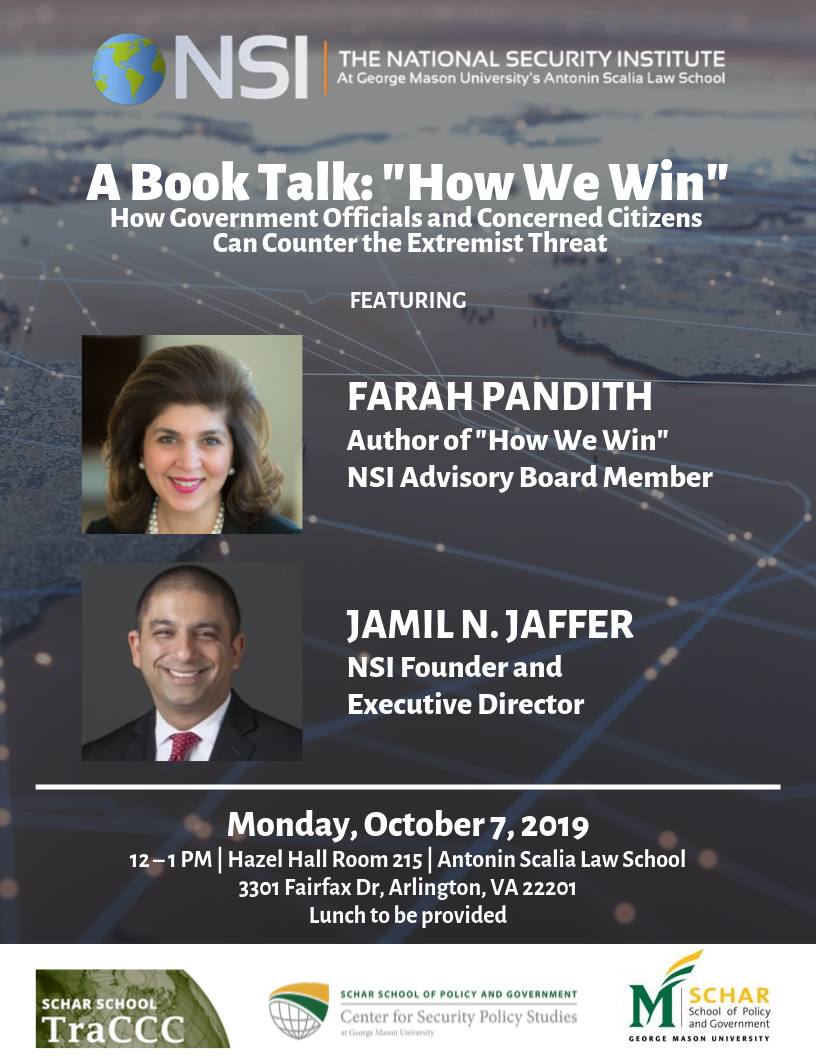
September 18 2019
Trade Based Money Laundering Conference
TraCCC hosted a full day conference on the very serious problem of trade-based money laundering. Multiple panels with specialists from the financial community, government, ACAMS, think-tanks, NGOs and academics discussed this phenomenon which is still extensively used to move large amounts of illicit funds tied to corruption, illicit trade, transnational crime and terrorism. Much of the money movement of the Panama Papers and the Troika laundromat was tied to trade-based money laundering. This conference explored the complex ways in which this presently underregulated form of money laundering operates and discussed strategies to address it.
Click here for the Conference Report
View a brief video here.
To view the flyer, please click here
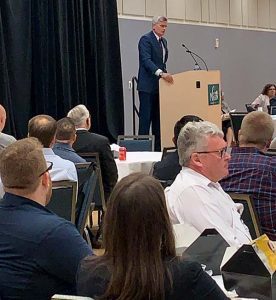
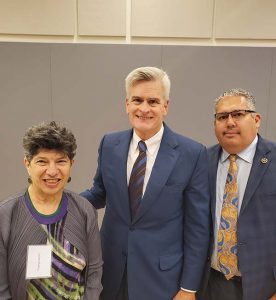
To view additional photos, please click here.
June 12, 2019: The Illicit Economy in Turkey: How Criminals Terrorists, and the Syrian Conflict Fuel Underground Markets
TraCCC was honored to host Dr. Mahmut Cengiz for a discussion on his most recent book, The Illicit Economy: How Criminals, Terrorists, and the Syrian Conflict Fuel Underground Markets. This book offers a rare insight into the transnational expansion and various corners of the illicit economy in Turkey. Dr. Louise Shelley moderated.
JUNE 5TH 2019: BY INVITATION ONLY – SEA OF SHADOWS FILM
TraCCC, ESP, the ISE, and The Elephant Action League were honored to host a special screening of Sea of Shadows, a film focusing on wildlife trafficking and the intelligence and undercover operations applied to environmental protection.
For more information please view the flyer below

June 4, 2019: Russia’s Crony Capitalism: The Path from Market Economy to Kleptocracy
TraCCC was honored to host Author Anders Aslund for a discussion with Dr. Louise Shelley focused on his new book. He discussed how the economic system Vladimir Putin has developed in Russia works to consolidate control over the country.
May 23, 2019: Fuller Seminar on Illicit Trade and Sustainability
TraCCC was honored that our director, Dr. Louise Shelley, was featured at the prestigious Fuller Seminar Series, May 23rd. She discussed illicit trade and evirnomental issues.
April 23, 2019: Research Findings: Illicit Hubs, Tobacco Trade, and Convergence with Illicit Commodities
TraCCC hosted a seminar discussing the results and implications of our research findings on illicit and counterfeit tobacco flows into key hubs in Europe: France and Southern Italy. Analysis focused on conditions facilitating supply and routes from North Africa and Ukraine. The convergence of this trade with other forms of smuggling were also addressed. Based on extensive field work and legal case analysis, the researchers revealed the dynamics of this trade and its convergence with other forms of illicit trade.
This seminar featured these experts:
- Xavier Raufer, Research Director, CNAM – Paris, Criminology Master & Research Center
- Simona Melorio, Researcher at University of Molise and at Res Incorrupta Center – Suor Orsola Benincasa University of Naples
- Yulia Krylova, Post-doctoral Researcher at the Terrorism, Transnational Crime, and Corruption Center (TraCCC) at George Mason University
- Louise Shelley, Hirst Chair and Director of TraCCC (moderator)
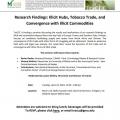
April 3, 2019: Big Data Utilization in Countering Transnational Organized Crime Featuring Alan Bersin
TraCCC was honored to host Alan Bersin, renowned authority on transnational crime and international relations. Mr. Bersin discussed the utilization of big data and contemporary analytics to counter transnational criminal activity. He explored the application of data fusion and machine learning technology to targeting and screening models geared to identify shipments in Dark Commerce. Bersin placed these developments in the context of risk management approaches implemented after 9/11.
View the flyer here.
March 25, 2019: NSF – GMU Conference on Disrupting Operations of Illicit Supply Networks
TraCCC co-sponsored the GMU-NSF Conference: Engineering Approach for Disrupting Operations of Illicit Supply Networks The conference invited the grant awardees of the recent NSF EAGER program as well as selected researchers, NSF program directors, and representatives from federal agencies, international organizations, industry, and think-tanks who work in the area of illicit trade networks. Dr. Louise Shelley, along with key TraCCC personnel Naoru Koizumi (event organizer), Alonso Aguirre, Maurice Kugler and Guadalupe Correa-Cabrera spoke at the NSF – GMU Conference.
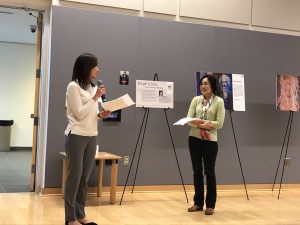
Naoru Koizumi
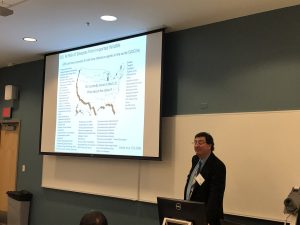
Alonso Aguirre
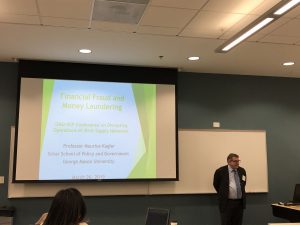
Maurice Kugler
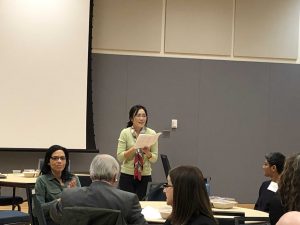
Naoru Koizumi
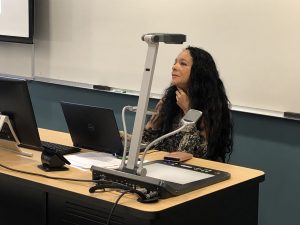
Guadalupe Correa-Cabrera
January 28, 2019: Dark Commerce: A Book Discussion with Dr. Louise Shelley
We were proud to host a discussion on the newly released book “Dark Commerce: How a New Illicit Economy Is Threatening Our Future.” Dr. Louise Shelley, the book’s author and director of the Terrorism, Transnational Crime and Corruption Center, discussed her work and shared information on this important topic. Furthermore, Alan Bersin, the former Commissioner of U.S. Customs and Border Protection, served as a moderator.
View the flyer here.
2018
November 28, 2018 The Abuse and Exploitation of Red Notices, Interpol and the U.S. Judicial Process by Russia and other Authoritarian States
TraCCC and the Antonin Scalia Law School’s National Security Institute (NSI) hosted a conference that focused on how the asylum and judicial process in the United States is being undermined and why. A very special group of speakers provided domestic and international perspectives on the problems that exist and offered thoughts on policies that can help mitigate risks.
View the conference report here.
View video of the event here (links to a playlist).
View the agenda here.
November 15, 2018 Examining the Links between Terrorist Financing and Antiquities Trafficking; Research Findings from the CLASI Project (Countering Looting of Antiquities from Syria and Iraq)
TraCCC hosted a panel discussion of research findings, by some of the archeologists, terror finance specialists, and other practitioners who worked on our U.S. State Department-funded CLASI project.
View the flyer here.
August 1: Corruption and the Russian Economy: A Book Discussion with Yulia Krylova
TraCCC hosted a discussion of corruption in Russia and its effect on the country’s economy. The books author, Yulia Krylova was present to discuss her findings. Additionally, Dr. Louise Shelley contributed to the discussion of the topic. View the flyer here.
May 31: The Trade: Episode 3
TraCCC hosted a screening of Episode 3 from the new Showtime Documentary Series, “The Trade”. Following the screening, there was a panel discussion and Q&A with Dr. Louise Shelley of TraCCC and Eric Olsen, Deputy Director of the Latin American Program and Senior Advisor to the Mexico Institute at the Woodrow Wilson International Center for Scholars, on transnational crime and its role in the opioid crisis. View the flyer here.
April 14 – 15: Human Trafficking Hackathon
TraCCCC hosted our first-ever overnight Hackathon from April 14th to April 15th, 2018 on the subject of Human Trafficking. We brought together subject matter and technology experts to work in teams to develop innovative technological solutions to the problems that face law enforcement, advocates, and service providers as they combat human trafficking and help the survivors.
March 23: Money Laundering in Real Estate: How is it done? How can we stop it?
TraCCC in association with sponsors, hosted an all-day conference bringing together representatives of government, law enforcement, financial institutions, academia and the real estate sector to better understand the impact of MLRE and how best to identify and counter it.
Click here to read the Money Laundering in Real Estate Conference Report.
February 6: Lines, Flows, and Transnational Crime: Toward a Revised Approach to Countering the Underworld of Globalization
TraCCC welcomed Alan Bersin, a renowned authority on transnational crime and international relations. His presentation proposed a new framework for combating transnational criminal activity. Mr. Bersin argues that Global illicit flows perpetrated by organized crime, in the interstices of lawful trade and travel, represent the principal security threat in today’s world, and that the Westphalian system of nation-states is ill equipped to confront it. Click here to watch the lecture.
2017
November 15 Kleptocratic Regimes and National Security: A Pervasive Threat and How It Can be Neutralized – Co-Sponsored with Hudson Institute
TraCCC and Dr. Louise Shelley joined a panel of experts to examine how to address the security threats posed by kleptocratic regimes. Videos of speakers are available HERE.
On November 15, 2017 TraCCC co-sponsored a conference at the Hudson Institute on “Kleptocratic Regimes and National Security: A Pervasive Threat and How It Can be Neutralized.”
It had two objectives:
- To identify and raise awareness about the vast array of threats that are caused or exacerbated by kleptocracies. These include great power competitors, nuclear aspirants, terrorism, organized crime, state failure, genocide, and obstruction of peace and stability operations.
- To propose and obtain feedback on recommendations for responding to this threat.
The following recommendations were addressed:
- Tailor assessment and planning to the threat from kleptocratic regimes
- Sever the flow of illicit revenue, the center of gravity for kleptocratic regimes, by:
- Passing beneficial ownership legislation
- Using data science to combat kleptocracy’s threat to national security
- Creating a database on the financial transactions of Politically Exposed Persons and a mechanism for the USG to share information about them with financial institutions
- Using the Global Magnitsky Act and other precision-guided policy tools to sever the flow of illicit revenue to kleptocrats who threaten our national security
- Use hybrid justice institutions to combat impunity by kleptocrats
- Make accountability a priority equal to capacity building in the security sector
Click to read the full report.
November 7 – Antiquities Trafficking: Why Should We Care? How Can We Counter It? Is It Funding Terrorism?
A panel discussion and chance to meet some of the amazing team of archeologists, terror finance specialists and other practitioners we will be working with on our new U.S. State Department-funded CLASI project.
Presenters:
- Patty Gerstenblith, Distinguished Research Professor, DePaul University College of Law
- COL Chris Herndon, US Army (Ret.), Senior Research Fellow, College of International Security Affairs
- Ira Spar, Professor of Ancient Studies at Ramapo College of New Jersey
- Ute Wartenberg Kagan, Executive Director, American Numismatic Society
View flyer here.
Oct. 18 – The Illicit Business behind the Opioid Epidemic: What Can We Do About It?
A full day conference sponsored by Schar School’s Terrorism, Transnational Crime and Corruption Center (TraCCC). Speakers discussed:
- Illicit actors and their business models
- New technologies: They fuel the epidemic but can be the key to taming it
- Policy gaps: What can law enforcement and government agencies do better?
Click to read the conference report.
Sept. 25 – Film Screening: American Exploitation: The Slaves among Us
TraCCC hosted the first ever screening of the new documentary, American Exploitation: The Slaves among Us, which focuses on the complex, subversive nature of sex trafficking and the efforts of social advocates, law enforcement agencies, state legislators, and victims-turned-heroes to effectively eradicate the volatile system from the idyllic area of southwest Florida and create lasting change in the world.
The film was followed by a panel discussion with the film producer, John Carter, and director, Ben Brothers.
Visit the film website HERE. View event flyer here.
Sept. 25 – Brazil: A Land Free of Organized Economic-financial Crime? with Judge Fausto Martin de Sanctis
TraCCC hosted Judge Fausto Martin de Sanctis, one of Brazil’s most renowned judges for his fight against organized crime, corruption, tax evasion and money laundering. See flyer here.
Sept. 11 – Remembering 9/11: The Financing of the 9/11 Attacks
On September 11, TraCCC hosted a panel presentation on the illicit finance of the Sept. 11, 2001 attacks, with financial investigation and anti-money laundering experts who took part in the post 9/11 investigations.
Presenters:
- John Roth – Senior Counsel & Team Leader, 9/11 Commission
- Dennis Lormel – Former Chief, Financial Crimes Section of FBI Criminal Division on 9/11
- John Byrne – Executive Vice-President, Association of Certified Anti-Money Laundering Specialists
See event flyer here.
Sept. 14 – NATO’s Building Integrity Programme with Susan Pond
TraCCC was honored to host Susan Pond, director of NATO’s Building Integrity Programme (BI) to discuss the BI Program which aims to understand corruption as a security risk and the impact on defense and security, and provides advice and support to NATO members and partners. See event flyer here.
May 10 – Unmasked: Corruption in the West with Laurence Cockcroft
Laurence Cockcroft to discussed his newest book which describes the more subtle forms of corruption which warp institutions in Europe and the US and currently fire the populism which has surfaced in both contexts impeding the ability of the west to assist in combating corruption in the developing world.
Unmasked: Corruption in the West with Laurence Cockcroft from Mason Schar School on Vimeo.
April 3 – Film Screening – Wildlife Crime Film Series Screening: The Ivory Game
In this Netflix Original documentary, filmmakers follow the ivory trade from the savannahs of Africa to the markets of Asia to expose the networks and corruption that are pushing the world’s largest land animal toward extinction. The film was followed by a panel discussion with Andrea Crosta, Executive Director of Elephant Action League, who is featured in the film, and Louise Shelley and Kasey Kinnard of TraCCC.
March 8 – Film Screening – The Poachers Pipeline:Dealers, Diplomats, and the Illegal Horn Trade
Film producer Kevin Hirten joined TraCCC for screening of this documentary film that goes underground to follow the illegal rhino trade from South Africa to Asia, exploring connections between high government officials, foreign diplomats and the organized crime networks that feed off of our global trade infrastructure. The film was followed by Q&A with Kevin Hirten of Al Jazeera, and Judy Deane and Kasey Kinnard of TraCCC.
February 16 – Threat Finance via Non-Traditional Revenue Streams: Diamonds, Tobacco, Counterfeits, & TBML
TraCCC convened a panel to discuss typically overlooked revenue streams of threat finance. Presenters shed light on nefarious actors’ involvement in various forms of illicit trade and natural resource exploitation to fund their activities. View event flyer HERE
Presenters & Panelists
- Mr. Chris Martin – Counsellor, U.K.’s Her Majesty’s Revenue & Customs
- Ms. Valerie Silensky – Senior Expert, AML/CFT Unit, U.S. Department of State, Bureau of International Narcotics and Law Enforcement Affairs
- Ms. Elizabeth Orlando – Economic and Commercial Affairs Officer, U.S. Department of State, Bureau of Economic and Business Affairs
- Mr. Dennis Lormel – President & CEO, DML Associates, LLC
- Dr. Sharon Melzer – Senior Fellow, TraCCC
February 3 – Governance in the Global Narcotics Trade
TraCCC co-hosted with the Center for Global Studies a full day conference on the governance of the narcotics trade. Patterns and processes through which the narcotics trade is governed in different locales and the implications this has for social and political systems were discussed. Discussions focused on this process from a global and local perspective including analysis of case studies in Brazil, the United States, Colombia, Central America, Mexico, and the Caribbean. View event flyer HERE
2016
December 9, 2016: Countering Wildlife Trafficking: Hot Spots, Congressional Action, and the Impact of CoP17, Featuring Worku Gachou
U.S. House Committee on Foreign Affairs, Matt Steed – U.S. State Department, Bryan Landry – U.S. Fish and Wildlife Service, and Jessican Hansen – C4ADS
Worku Gachou discussed the history, motivation, and intent of the END Wildlife Trafficking Act which was recently passed. Matt Steed discussed State Department plans for implementation of the Act. Bryan Landry discussed the global work of USFWS to combat wildlife trafficking, and the impacts of the September CITES meeting in South Africa. Jessica Hansen discussed the work of C4ADS to use innovative technology and network analysis to combat wildlife trafficking and the hot spots and emerging trends they see. View flyer
May 11, 2016: The Panama Papers Panel: Tax Havens – Who, Why, & Impacts, Featuring: Marina Walker Guevara
Manager, Panama Papers Investigation and Juan Ricardo Ortega – Former Commissioner, Tax & Customs (Colombia)
Marina Walker Guevara discussed how the Panama Papers investigation came to be, how it was conducted, and how the information has been analysed and shared.
Juan Ricardo Ortega discussed how the use of tax havens and shell companies allows for the presence of trade based money laundering around the world and in Latin America. View flyer
April 5: The Dark Web and Human Trafficking featuring David Bringle
Mr. Bringle led a presentation on the role of the dark web in human trafficking and new technological methods for finding and combatting it. Discussion was based on his work with the Defense Advanced Research Projects Agency (DARPA). He discussed the dark web, challenges for conducting research in that space, and cutting edge efforts to make the dark web more transparent to law enforcement working to combat human trafficking. View flyer
February 25, 2016 Nuclear Smuggling, Featuring: Orde Kittrie, J.D. & Louise Shelley, PhD.
Orde Kittrie and Louise Shelley discussed the findings and conclusions of their research, funded by the MacArthur Foundation, on the trade and smuggling of nuclear materials and the challenge of combating it. View the event flyer
January 21, 2016 – Campbell Fraser, PhD. – Human Organ Trafficking: Understanding the Changing Role of Social Media and Dark Web Technologies 2010-2015
Dr. Fraser discussed regular travels to investigate organ trafficking, including covert work with authorities in 21 “selling” and 24 “buying” countries. View event flyer.
2015
15 October 2015: Curtailing Corruption: People Power for Accountability & Justice
Shaazka Beyerle discussed her book, Curtailing Corruption: People Power for Accountability and Justice, that examines how citizens – organized in nonviolent campaigns, social movements, and community initiatives – play a vital role in impacting corruption. Note that the events discussed are fluid and ongoing. At the time of posting, road building in the Khimki Forest has moved forward, against the wishes of protesters. Learn more about the book and speaker here. View the event flyer.
4 May 2015 Mark Pyman, Programme Director, Transparency International
Discussion of Transparency International work in the defense and security spheres, and current challenges. View event flyer.
27 April, 2015 Panel Presentation: Human Trafficking in Northern Virginia with Special Guest: U.S. Representative Barbara Comstock
Presenters:
- U.S. Representative Barbara Comstock, Virginia 10th Congressional District
- Delegate Tim Hugo, Majority Caucus Chairman
- Detective William Woolf, Fairfax County Police Department Human Trafficking Unit
- Beth Saunders, Business Sector Chair, Just Ask Prevention Project
- Deepa Patel, Coordinator, Sex Offender Program; Director, Gang Intervention and Sexual Exploitation Programs, Multicultural Clinical Center
- John Cook, Braddock District Supervisor
View the event here. The event gets underway at the 7 minute mark. View event flyer.
16 March 2015 Combating Criminalized Power Structures: Predominant Spoilers of Peace Missions
George Mason Univerisity’s Peace Operations Policy Program and TraCCC co-sponsored a full day’s discussion, with members of the UN High-level Independent Panel on Peace Operations, of recommendations for combating criminalized power structures–the leading spoilers of peace and stability operations. This will be based on conclusions from the new book, “Overlooked Enemies of Peace: Subduing Criminalized Power Structures”
Presenters Included:
- Desmond Arias, Director, George Mason University Peace Operations Policy Program
- Stefan Feller, Senior Police Advisor, UN Department of Peacekeeping Operations
- David Beer, former Police Commissioner from the UN mission in Haiti (MINUSTAH)
- Ameerah Haq and Andy Hughes, Vice Chair and member of the UN High-level Independent Panel on Peace Operations (closing remarks)
Watch selected speakers here. View event flyer.
3 March 2015: The Impact of Organized Crime on Governance, Development, and Fragility in Africa
TraCCC welcomed the Global Initiative Against Transnational Organized Crime, in Washington for its 2015 advisory board meeting. The speakers, top specialists on Africa’s organized crime and the crime-terror relationship, highlighted the need to reconceptualize organized crime as an evolving threat to development, and addressed the complexities of transnational crime in all regions of sub-Saharan Africa.
The panel featured experts from throughout Africa:
- Mark Shaw, Director of the Global Initiative
- Camino Kavanagh, Independent Expert
- Peter Gastrow, Senior Advisor, Global Initiative
- Tuesday Reitano, Head of Secretariat, Global Initiative
Learn about the Global Initiative at their website. View event flyer.
22 January 2015: Human Trafficking Panel Presentation: The Situation in Northern Virginia and The Way Forward
TraCCC commemorated Human Trafficking Awareness Month with a panel presentation featuring experts from multiple industries. Speakers presented the current situation in the Northern Virginia region, and what can be done to address it.
The panel featured experts from multiple industries:
- Kristen Fitzsimmons, Executive Director, Just Ask Prevention Project
- Bill Woolf, Detective, Fairfax County Police Department, Human Trafficking Unit
- Steve Steinberg, President, MEI Hotels
- Nes Parker, Manager, Monitor Deloitte
- Sandy Saunders, Co-Managing Shareholder DC at Greenberg and Traurig, LLP. (moderator)
Watch this lively presentation and the following discussion. View event flyer.
2014
November 6, 2014: Organized Crime and Corruption in Central America
TraCCC, in conjunction with GMU Latin American Studies, hosted Dr. Claudia Paz y Paz and a discussion of organized crime and corruption in Central America. View event flyer.
Claudia Paz from MasonSPGIA on Vimeo.
October 22, 2014: Dirty Entanglements Book Launch at Carnegie Endowment for International Peace
TraCCC director, Dr. Louise Shelley, spoke at the Carnegie Endowment for International Peace. Dr. Shelley discussed her book, Dirty Entanglements, Corruption, Crime and Terrorism.
Moisés Naím acted as moderator, and Milan Vaishnev acted as discussant for this exciting talk. Video of this presentation is available here.
September 15, 2014: Dirty Entanglements: Crime, Corruption, and Terrorism
TraCCC hosted a talk by its director, Dr. Louise Shelley, who discussed her newly-published book, Dirty Entanglements: Corruption, Crime and Terrorism (Cambridge University Press 2014). View event flyer.
TRACCC presents discussion of Dirty Entanglements from MasonSPGIA on Vimeo.
July 18, 2014: Disengaging from Terrorism: Lessons from the Turkish Penitents
TraCCC hosted Dr. Kamil Yilmaz, who discussed his recently published book in the TraCCC book series, Disengaging from Terrorism: Lessons from the Turkish Penitents (Routledge, 2014). View event flyer.
May 2, 2014: The Role of Corruption in Recent Events in Ukraine
TraCCC hosted a talk on The Role of Corruption in Recent Events in Ukraine by Visiting Fulbright Scholar Dr. Olena Shostko. View event flyer.
18 April, 2014: Sex+Money: A National Search for Human Worth Screening
TraCCC co-hosted a film showing and lecture on human trafficking, presented by Love146 in association with Courtney’s House.
Sex+Money: A National Search for Human Worth is a documentary about domestic minor sex trafficking and the modern-day abolitionist movement fighting to stop it. The film will be followed by a guest talk by Tina Frundt, Executive Director and Founder of Courtney’s House, a survivor-run organization which, like Love146, provides a loving environment for girls and boys who are survivors of sex trafficking within the United States. View event flyer.
4 February, 2014: The Illicit trade in Wildlife
Richard Ruggiero (US Fish and Wildlife Service) spoke on ivory and gold in Minkebe (Gabon), Kelvin Alie (International Fund for Animal Welfare) described how NGOs are helping to fight wildlife crime, and Gretchen Peters (TraCCC) spoke of strategies and challenges for investigating illicit networks. View event flyer.
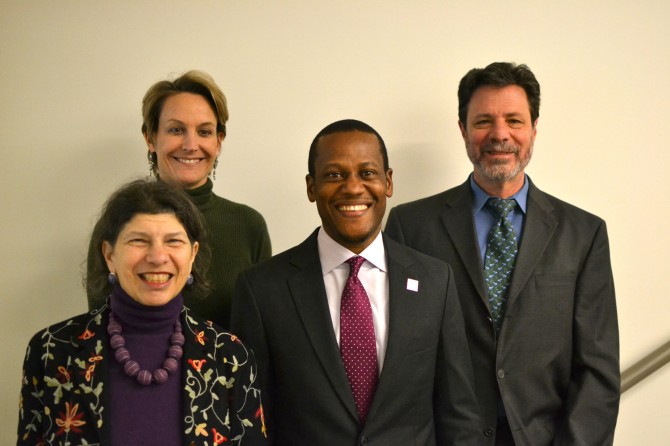
(Left to right) Louise Shelley, Gretchen Peters, Kelvin Alie and Richard Ruggiero
2013
15 November, 2013: George Mason University’s School of Public Policy hosted a discussion called Pay Attention to the South Caucasus. Ambassadors (ret.) Richard Kauzlarich and Kenneth Yalowitz, together with Ambassador (ret.) John Evans, met at Mason to discuss how developments in the region and globally have affected these three countries.
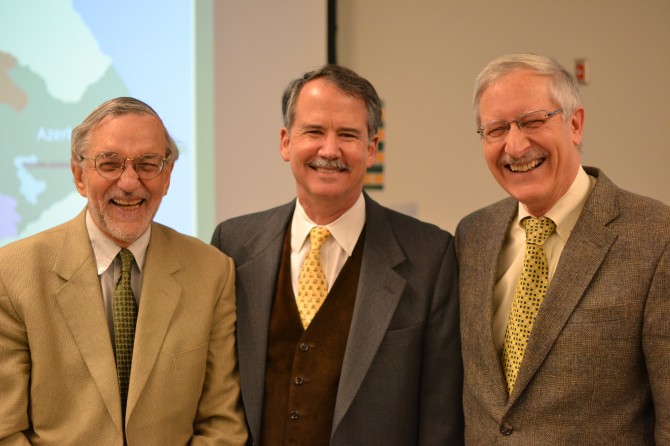
(Left to right) Ambassadors (ret.) Kenneth Yalowitz, John Evans & Richard Kauzlarich
14 November, 2013
TraCCC affiliate scholar Professor Desmond Arias gave a guest lecture entitled Armed Actors and Governance in Latin America and The Caribbean.
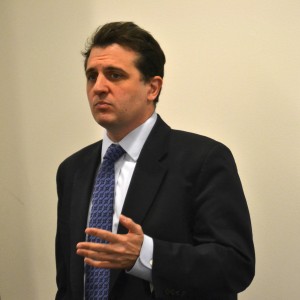
8 November, 2013
TraCCC hosted a guest lecture and book launch event to celebrate the publication of Environmental Crime and Corruption in Russia: Federal and Regional Perspectives with Routledge. Editors Sally Stoecker and Ramziya Shakirova discussed this new collection of TraCCC-sponsored research, which deals with such issues as radioactive pollutants, illegal logging, wildlife poaching and toxic waste, as well as the roles of organized crime groups and the Russian government in environmental devastation.
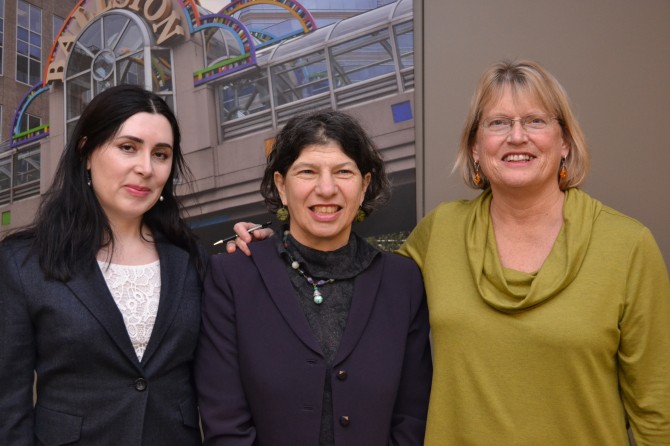
(Left to right) Ramziya Shakirova, Louise Shelley & Sally Stoecker
11 October, 2013
Professor Rasma Karklina visited the center, and gave a talk entitled Does Anticorruption Work? Latvia’s Experience. Professor Karklina currently works in Latvia, where she is a member of parliament and its sub-committee on anticorruption issues. She is also former chair of political science at the University of Illinois at Chicago.
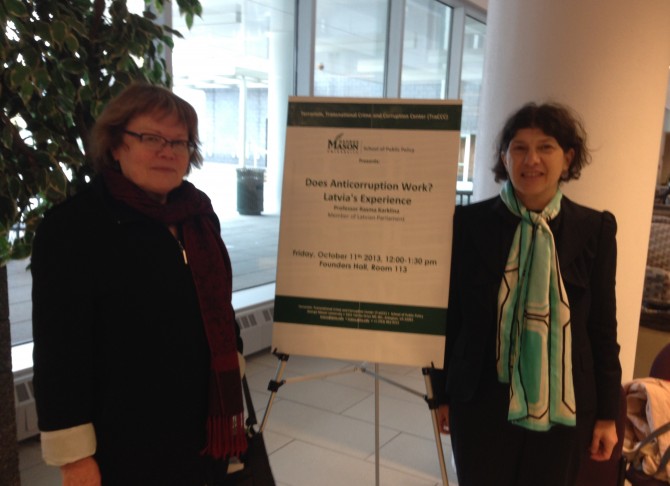
14 June, 2013
TraCCC affiliate scholar Dr. Veerendra Mishra presented a showing of Do I have a Choice? A Saga of Socially Sanctioned Sexual Servitude, his short documentary film about the ‘Bedia’ community in India, where prostitution is an accepted practice in the midst of conservative Indian society. Following the film, Dr. Mishra took questions from the audience. An interview with Dr. Mishra will be published in our monthly publication, INSIDE TraCCC (subscribe here), and the full film will be available for streaming on TraCCC’s website in Fall 2013. 17 May, 2013: TraCCC invited Dr. Richard Medina to give a guest lecture on The Geography of Terrorism. Dr. Medina discussed several themes from the new book The Geography of International Terrorism: An Introduction to Spaces and Places of Violent Non-State Groups (CRC Press, 2013), of which he is co-author (with George F. Hepner).
30 April, 2013
TraCCC hosted a Panel on Illicit Networks and National Security to mark the publication of Convergence: Illicit Networks and National Security in the Age of Globalization, by the National Defense University Press. Attendees received a copy of this important new book, which discusses the challenge of converging and connecting illicit networks; how the proliferation, convergence, and horizontal diversification of illicit networks challenge state sovereignty; and how different national and international organizations are fighting back. The entire book can be downloaded at this link.
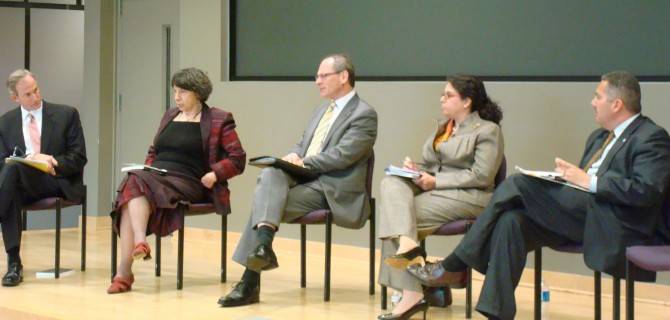
Panel on Illitict Networks and National Security
TraCCC Director Dr. Louise Shelley moderated the esteemed panel, whose discussants were: Michael Miklaucic, Director of Research, Information, and Publications in the Center for Complex Operations (CCO) at the National Defense University; Douglas Farah, President of IBI Consultants and a Senior Fellow at the International Assessment and Strategy Center; Danielle Camner Lindholm, a Technical Director in the BAE Systems Intelligence and Security Sector; and David M. Luna, Director of Anti-Crime Programs at the Department of State’s Bureau of International Narcotics and Law Enforcement Affairs. Greg Gatjanis of the U.S. Department of the Treasury attended as a guest moderator and discussant. 19 April, 2013: A panel of experts from U.S. Immigration and Customs Enforcement (ICE) Homeland Security Investigations (HSI), the Homeland Security Study and Analysis Institute, and the International Assessment and Strategy Center presented the summary findings of a soon-to-be-published open source article, focusing on human smuggling activities along the Southwest U.S. Border from 2008-2011. 12 April, 2013: Matthew Levitt discussed his forthcoming book, Hezbollah, The Global Footprint of Lebanon’s Party of God, which is the first thorough examination of Hezbollah’s covert activities beyond Lebanon’s borders, including its financial and logistical support networks, and its criminal and terrorist operations worldwide. 19 March, 2013: TraCCC hosted a talk by Professor Gabriella Sanchez entitled Violence as an Element of Irregular BorderCrossings: Human Smuggling Operations in the US Southwest. 4 March, 2013: Dr. Louise Shelley hosted a guest panel on the Illicit Trade in Wildlife, as a special meeting of her class on Illicit Trade. The panel addressed problems of the illegal trade in animals, tiger poaching, globalization, and disease control. Her distinguished visitors came from the Smithsonian-Mason School of Conservation: Jennifer Sevin, Mahendra Shrestha, and A. Alonso Aguirre.
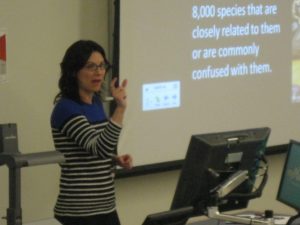
Jennifer Sevin gives an overview of the illegal trade in wild animals, and what the Smithsonian Conservation Biology Institute is doing to combat it
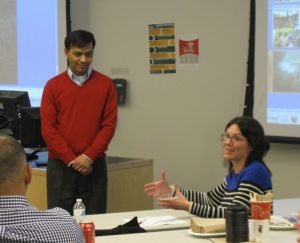
Mahendra Shrestha and Jennifer Sevin take questions about the poaching of tigers and other critically endangered species
1st March, 2013
TraCCC presented a talk by Professor Celina Realuyo, Assistant Professor of National Security at the National Defense University. Professor Realuyo’s talk, Following the Money to Combat Terrorism and Crime, examined the way in which globalization has facilitated the convergence of illicit neworks, including those of terrorist groups. She presented an overview of money laundering techniques, new trends in terrorist financing, and measures employed by the U.S. to detect, dismantle and deter terrorist financing networks. She emphasized the need to foster collaboration between those in law enforcement, intelligence agencies and the military at the national, regional and international levels, as well as between the civic, public and private sectors. Professor Realuyo has kindly provided a pdf of her presentation for interested parties. Event Flyer
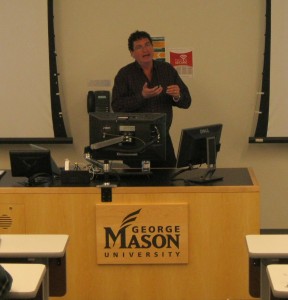
Professor A. Alonso Aguirre discusses the influence of biodiversity on the emergence and proliferation of human diseases
25 January, 2013
TraCCC hosted a talk by Dr. Adam Lankford, assistant professor of criminal justice at The University of Alabama, on the mindset of suicide terrorists and rampage shooters. Professor Lankford argued that many of these individuals are “suicidal, in the clinical sense”, and that their desire to die may be independent of their beliefs in a given cause. He presented evidence from his recent book, The Myth of Martyrdom: What Really Drives Suicide Bombers, Rampage Shooters, and Other Self-Destructive Killers, that these individuals have a desire to kill and be killed (thereby attaining fame and glory), as well as a profound sense of victimization, often exacerbated by mental health problems. Event Flyer
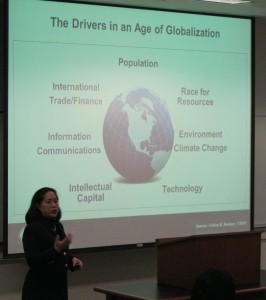
Celina Realuyo shows how globalization has fostered the convergence of organized crime and terrorism
2012
13 December 2012
TraCCC hosted David M. Cattler, director of the Defense Combating Terrorism Center (DCTC) at the Defense Intelligence Agency. Mr. Cattler gave a talk entitled The Nexus of Crime and Terrorism: New Security Challenges in the 21st Century. Event Flyer
17 October 2012
TraCCC’s own Ambassador (ret.) Richard Kauzlarich and Ambassador (ret.) Kenneth S. Yalowitz hosted the talk, “Reality Diplomacy: How Ambassadors Deal with Crime and Corruption Abroad”. Event Flyer
4 October 2012
TraCCC hosted Jeanine Zeitvogel from Casals & Associates, to Present on “Anti-Corruption Technical Assistance: A Growth Industry for Better or Worse”. Event Flyer, Presentation
21 September 2012
TraCCC hosted Jim Wickens, Pioneering Environmental Journalist from the Ecologist Film Unit to discuss his groundbreaking undercover documentaries on environmental crime. Event Flyer
12 September 2012
TraCCC hosted Award Winning Journalist, Gretchen Peters, to discuss her recently released study, The Haqqani Financing Network: The Evolution of an Industry. Event Flyer
17 April 2012
TraCCC and the Washington Area Chapter of the Internet Society co-hosted a roundtable discussion on “Transparency vs. Corruption: The Internet as a Disinfectant.”
12 April 2012
TraCCC with Anka Rising and Virginia-Stop Modern Slavery hosted a panel discussion on “Corporate and Social Responsibility and Modern-Day Slavery.”
8 April 2012
TraCCC hosted Muhiddin Tojiev and Sharofiddin Soliev to present on “Corruption in Tajikistan: Causes and Consequences.” Event Flyer, Panelist Biographies, PowerPoint Presentation.
21 February 2012
TraCCC hosted Dr. Aleksandr Zelitchenko, Director of the Central Asian Drug Policy Center and Coordinator of the EU Central Asian Drug Action Program in Bishkek, Kyrgyzstan. He presented on “Current Drug Trends in Central Asia.” Flyer, Presentation, Article: Blaming the Third Force, the role of the narcotics trade in the Osh tragedy(English, Russian)
20 January 2012
TraCCC hosted Major General Muniruzzanam (ret.) of the Bangladesh Institute of Peace and Security Studies to discuss “The Security Dimensions of Climate Change.” Flyer, Presentation, National Security and Climate Change Video via LinkTv.
2011
7 October 2011
TraCCC hosted Fashihuddin, Founder for the Pakistan Society for Criminology and Chief-in-Editor of the Pakistan Journal of Criminology. He is a senior officer of the Police Service of Pakistan (PSP), the author of Expanding Criminology to Pakistan, and holds a MBBS, LLB and MA in Political Science. Currently, he is the Director General of Human Rights in the Central Police Office of the KPK Province in Pakistan. He has served in many positions with various law-enforcement agencies including the Frontier Constabulary, the Intelligence Bureau, and the Federal Investigation Agency. Event Flyer, Presentation
25 April 2011
TraCCC hosted Grant Newsham, an executive director for corporate security at a prominent Western financial services firm in Japan, to discuss, “Yakuza Influence on the Japanese Financial Sector: Security and Solvency in Japan.” Event Flyer
19 April 2011
TraCCC hosted a panel of Visting Scholars from the Center for Northeast Asian Policy Studies at the Brookings Institute to discuss, “Asian Perspectives on Transnational Crime and Human Trafficking.” Event Flyer, Panelist Bios, Ho-Jin Lee Bio, Event Write Up
18 April 2011
Dr.Louise Shelley was a guest panelist at the Kennan Institute for a talk entitled, “Unique Aspects of Human Trafficking in Eurasia.” The talk discussed the business model of human trafficking from the former Soviet Union. This model, which Shelley terms “the natural resource model,” shares many characteristics of Russian trade in other areas and will be compared with trafficking from other regions of the world. IT also discussed recent developments in all forms of human trafficking from and within the former USSR. Further Information about this Event
8 March 2011
TraCCC hosted Professors Alain Bauer and Xavier Raufer, two French Government advisors on crime and terrorism in the conference entitled, “Security Threats: A French Perspective and Response.” They discussed France’s views on current security challenges and the recent government reorganization to address these challenges. Their understanding of France’s long involvement with the Arab world and with Africa provided a unique perspective on international security. Event Program, Panelist Bios, Relevant Publications, Event Write Up
28 February 2011
TraCCC announced the latest edition to the Routledge Book Series. The book entitled, Human Security, Transnational Crime, and Human Trafficking: Asian and Western Perspectice, contrasts the experience and perception of transnational crime and human trafficking in Asia with that in the West. Event Program, Purchase this Book, Photos from Book Event
22 February 2011
TraCCC hosted a conference entitled, “The Nature, State and Capacity to Address Illicit Trade in Tajikistan and its Effect on (In)Security in Central Asia.” The two panels discussed Actors and the Stage: The State of Tajikistan Today and Terror and Crime: A Nexus or Just Convergences of Opportunity?. Further information: Event Program, Panelist Biographies, Relevant Publications, Panel Photo, Conference Write Up
31 January 2011
Dr. Louise Shelley was a guest on the Radio Show, Sins of Omission, to discuss her book, “Human Trafficking: A Global Perspective. The link to the show can be found here.
January 28, 2011
TraCCC hosted Alexandre Kukhianidze, the Director of of the Terrorism, Transnational Crime, and Corruption Center’s (TraCCC) Caucasus Office, for a rountable discussion on “Combating Corruption in Georgia: Reforms without Democratization?” He writes extensively on corruption, organized crime, smuggling, security issues, and Georgia-Russia relations. Previously, he was a Fulbright scholar at Mount Holyoke College and Johns Hopkins University, Deputy Chief of Party of USAID’s Local Government Reform Initiative, and Chief Editor of the academic journal ‘Caucasian Regional Studies.’ He is currently a visiting research fellow at the James Martin Center for Nonproliferation Studies at the Monterey Institute of International Studies and is working on problems of civil security and defense in Georgia and the Caucasus.
2010
December 23rd
TraCCC hosted Ikhram Seghal, a distinguished Pakistani Defense Analyst. Ikram Sehgal, runs the largest security firm in Pakistan, Pathfinder G4S. He writes widely on crime, terrorism and corruption and has hosted a weekly television in Pakistan. He is a syndicated columnist and Chief Editor of the Defense Journal. Trained at the Pakistan Military Academy, he serves on the boards of many international organizations. He is presently on the Global Advisory Council on Terrorism of the World Economic Forum. On August 25, 2011, Seghal wrote an article entitled “Socio-political factors and National Security.”
October 25th
Louise Shelley had an event for her book, “Human Trafficking: A Global Perspective.” Her book examines all forms of human trafficking globally, it demonstrates that there is more than one business model of human trafficking and that there are enormous variations in human trafficking in different regions of the world. Drawing on a wide body of research conducted by the author over the last sixteen years in Asia, Latin America, Africa, Europe, and the former socialist countries – Louise Shelley concludes that human trafficking will grow in the twenty-first century as a result of economic and demographic inequalities in the world, the rise of conflicts, and possibly global climate change. Coordinated efforts of government, civil society, the business community, multilateral organizations, and the media are needed to stem its growth.
October 22nd
TraCCC in coordination with DC Stop Modern Slavery hosted film director, Guy Jacobson, to discuss and show his documentary, “REDLIGHT.” UNICEF Goodwill Ambassador Lucy Liu produced and narrated REDLIGHT, an inspiring and powerful feature documentary about child sexploitation. Filmed over a four year period, REDLIGHT focuses on the personal stories of the victims and two remarkable advocates for change: grass-roots activist Somaly Mam and politician Mu Sochua. To view the trailer, please visit www.redlightthemovie.com. October 19th- TraCCC hosted a panel discussion for a Ukrainian Open World Delegation entitled, “Providing Assistance to Victims of Child Exploitation in Ukraine.” October 12th- TraCCC in coordination with the Institute for Conflict Analysis and Resolution at George Mason University hosted Guest Speaker, Thomas da Waal, to speak about his book “The Caucasus: An Introduction.” Thomas de Waal is a writer and analyst on the Caucasus, Russia and the Black Sea region and a Senior Associate with the Russia and Eurasia program at the Carnegie Endowment for International Peace in Washington. His book can be purchased through any major bookstore.
October 5th
TraCCC hosted a conference entitled, “Instability in Central Asia:Scale, Scope and regional Consequences.” The conference addressed demographic trends, religious extremism, political instability and ethnic violence in Central Asia, their impact on vulnerable populations and their contribution to the rise of Islamic fundamentalism, organized crime, illicit trade and political stability in the region.
July 22nd
TraCCC hosted a conference entitled, “Human Insecurity in West Africa: Irregular and Forced Migration, Drugs, and Arms and Human Trafficking.” The conference addressed many of the major challenges that West Africa faces including irregular/ cladestine migration, forced migration as a result of climate change and conflict, sexual and labor trafficking and the drugs and arms trade.
June 16th
TraCCC hosted a Ukrainian Delegation through the Open World Program focusing on Human Trafficking. The delegation held a Panel at the International Organization for Migration office in downtown DC entitled, “Preventing Human Trafficking & Rehabilitating Survivors in Ukraine: Perspectives from Civil Society and Law Enforcement.”
May 24th
TraCCC hosted a Russian Delegation through the Open World Program which focused on Environmental Crimes. The delegation held a Panel entitled, “Environmental Crimes and Resource Protection in Russia.” Anatoly Kabanets, Coordinator of Forest Projects with the World Wildlife Fund presented on “Experience in Countering Illegal Logging in Primorskii Krai.” Gennady Zherebkin, Legal Adviser for the World Wildlife Federation Russia, Amur Branch presented on, “Ecological Crime in Primorskii Krai.”
May 3rd
Funded by the Turkish Institute for Security and Democracy, TraCCC hosted a conference entitled, “The Crime-Terror Nexus: Perspectives and Lessons Learned from International Researchers and Practicioners.” The conference presented analysis of terrorist financing and activity, based primarily on data made available from the Turkish National Police on the terrorist organization, PKK (Kurdistan Worker’s Party). Panels addressed diverse forms of terrorist financing and crime networks extending from Central Asia, through the Middle East and to Europe. Participants include high-level international officials and researchers who have studied data on the crime-terror relationship.
February 25th and 26th
Funded through TraCCC hosted a conference entitled, ” Criminal Networks, Smuggling, and WMD.” The conference addressed the problem of criminal facilitation in WMD proliferation in the United States and abroad. Speakers focused on actual cases and not hypothetical scenarios, and confirmed linkages between crime and terrorist groups were discussed and analyzed.
January 19th
Louise Shelley spoke the the Panel, “Tracking Organized Crime and Terrorism in the Digital Age,” which was hosted by the International Center for Journalists todiscuss how reporters are using new technology to reveal and track networks that threaten countries around the world.Also on the Panel was Knight International Journalist Fellow, Paul Cristian Radu, aninvestigative journalist and co-founder of the Romanian Center for Investigative Journalism. Radu’s Investigative Reporting Manual entitled, “Follow the Money- A Digital Guide to Tracking Corruption,” can be found on the site.
2009
December 10th
TraCCC hosted a new Open World delegation from Russia who spoke on “Safeguarding Russia’s At-Risk Groups:Assisting Human Trafficking Victims and Programming for At-Risk Youth.”
October 28th
TraCCC presented a panel of six distinguished anti-trafficking professionals and victims’ assistance providers from Ukraine to discuss “The Face of Human Trafficking in Ukraine: Assisting Victims and Diverting At-Risk Groups” as part of its Open World Leadership Program. Click here for presentations about the Vesta NGO by Inna Sabadosh, the Dovira MET Women’s Youth Organization by Maryna Shornikova, the Ministry of Family, Youth and Sports of Ukraine by Nataliya Sukhorukova, and the “Road to Life” NGO by Yana Sharun.
October 23rd
As part of TraCCC’s Open World Leadership Program, the International Organization for Migration (IOM) hosted a brown-bag lunch featuring a presentation by a TraCCC Open World delegate on methods of providing assistance to victims of human trafficking in Ukraine. The presentation by Olena Sichkar can be found here.
October 21st
TraCCC hosted a conference entitled, “Drug Flows Out of Afghanistan and Pakistan.”TraCCC’s scholars from countries along the drug route commented on the conditions that facilitate the trade from the point of origin to Western European Countries. Here are the Biographies of the Speakers, Relevant Publications, and Speaker Mahmut Cengiz Power Point Presentation.
September 10th
TraCCC hosted the conference, “US Policy on Transnational Crime” which consisted of 4 panels discussing Drug Trafficking, Mexico, and US Policy, Human Smuggling and Trafficking, Why Countering Counterfeiting and Diversion Deserve More Policy Attention, and Countering Transnational Crime
August 19th
TraCCC hosted “An Anti-Corruption Exchange” with a small group of officials from Southern Sudan tasked by GOSS with the establishment of southern Sudan’s first anti-corruption body and legislative framework.
May 4th
TraCCC hosted a major policy talk with Mr. David Luna, Director for the Anti-Crime Programs at the Bureau for International Narcotics and Law Enforcement (INL) Affairs in the US Department of State. The talk was largely focused on thematic threat convergence issues and the United States’ recent diplomatic efforts to combat transnational threats and dismantling threat networks.
For further information concerning the State Department’s programs and initiatives on combating transnational crime and corruption please go to http://www.state.gov/p/inl/
April 16th
TraCCC hosted an event, “What Is Needed?: The Way Ahead for WMD Policy” at the School of Public Policy. This Weapons of Mass Destruction Conference discussing the theoretical and operational frameworks of the policy domestically and abroad, and what is needed for the future.
2008
November 20
TraCCC hosted a launch for Russia’s Battle with Crime, Corruption and Terrorism, the latest book in TraCCC’s Routledge transnational crime and corruption series, with the book’s editor, Dr. Robert Orttung.
September 24
TraCCC in collaboration with the Open World Leadership Program organized an event entitled “Child Trafficking and Exploitation in Russia: Scale and Scope”, featuring four visiting law enforcement and NGO professionals from Russia who work to combat child exploitation crimes and bring its perpetrators to justice. Presenters included Mr. Vadim Kulazhnikov of the Russian Far East Law Enforcement Training Institute, Ms. Ekaterina Avdas of the Vladivostok City Foster Care Administration, Ms. Marina Ryabko of a St. Petersburg Shelter for Exploited Youth and Ms. Zinaida Malykhina, Youth Services Director of a Chelyabinsk City Vocational School.
September 10
TraCCC in collaboration with the Open World Leadership Program organized an event entitled “Rescuing Lives, Restoring Hope: Assisting Human Trafficking Victims in the Russian Federation “, featuring five visiting professionals from Russia who provide assistance to human trafficking victims. Presenters included Ms. Tamara Petrova of the Rostov Women’s Crisis Shelter, Ms. Ksenia Tuzova of the NGO “Fatima” in Tatarstan, Ms. Marina Erlikh of the Moscow-based NGO “Syostri”, Ms. Svetlana Goncharova of the Far East State University of Economics and Service, and Mr. Eduard Perepelkin of the Astrakhan-based “Oratorium” Crisis Center for Youth.
March 27
TraCCC in collaboration with the Focus on Central Asia Program organized an event entitled “Human Trafficking in Central Asia: The Case of Kyrgyzstan”, featuring four visiting professionals from Kyrgyzstan who provide victims’ assistance and influence policy to combat human trafficking. Presenters included Mr. Kanatbek Osmonov of the Osh City Migration Service, Mr. Igor Shugalskiy of the Federal Procuracy of Kyrgyzstan, Ms. Ainura Usupbekova of the NGO “Elsen” and Mr. Talaaibek Abdraimov of the NGO “Podruga”.
2007
December 13
TraCCC organized an event entitled “Human Trafficking from Southern Russia”, featuring four visiting law enforcement officials and academics from Russia’s volatile southwestern region who work on various aspects of addressing Russia’s human trafficking problems and assisting its victims.
October 16
TraCCC hosted a book launch event entitled featuring the authors of Merchant of Death, which chronicles the inner workings of Russian arms dealer Victor Bout’s transnational arms trade organization, as well as oft-thwarted attempts by U.S. officials and international investigators to quell his operations. Douglas Farah, former Washington Post West Africa Bureau Chief, and Stephen Braun, Los Angeles Times National correspondent, discussed their exhaustive research into this case and the many questions left unanswered as to Victor Bout’s ability to avoid arrest and prosecution.
October 24
TraCCC organized an event entitled “Combating Modern-Day Slavery in Russia”, featuring four visiting Russian law enforcement officials and academics who work on various aspects of addressing Russia’s human trafficking problems and assisting its victims.
October 30
TraCCC hosted a book launch event entitled “Is Everything Coming Up Roses? Georgia’s Battle with Organized Crime and Corruption following the 2003 Revolution”. The event featured TraCCC Director Dr. Louise Shelley and former TraCCC Georgia Program Managers Erik Scott and Anthony Latta, who co-edited TraCCC’s newest volume in its Routledge Publications series entitled Organized Crime and Corruption in Georgia, which examines the most enduring aspects of organized crime and corruption in Georgia and the most important reforms since the Rose Revolution.
April 23
TraCCC hosted a presentation by Dr. Anna Jonsson, Assistant Professor, Department of Eurasian Studies, Uppsala University, and Project Director, Constitution Developments and Human Rights at the Silk Road Studies Program. Dr. Jonsson’s presentation was entitled “Fighting Human Trafficking in Northern Europe: Is Demand Reduction Feasible?”
Wednesday, April 18
TraCCC hosted Russian scholar Irina Olimpieva, who presented her recent work on informal business practices in St. Petersburg. In particular, she focused on the rise of intermediaries in cross-border trade. A working draft of her paper, co-authored by Dr. Eric Gordy, is available, as is a brief presentation paper co-authored with Oleg Pachenkov. Irina Olimpieva is a sociologist at The Center for Independent Social Research in St. Petersburg, Russia.
Tuesday, April 10
Dr. Jan Van Dijk spoke at TraCCC’s lecture on the topic, “Mafia Markers: Measuring Organized Crime and its Impact on Societies.” A short summary of the event, and a biography of Professor van Dijk, can be found here. A working draft of his latest paper has been made available.
March 26
TraCCC welcomed Bruno Schild of Brand Integrity LA&C, Philip Morris International to lecture on “Fighting Illegal Trade: A Multinational Corporation’s Perspective.” Mr. Schild’s presentation included: global issues of illicit cigarette trade; strategies and action; government cooperation; private investigation; communication programs for trade and consumers, and case studies from around the world.
TraCCC, in partnership with the Chelyabinsk NGO, Women’s Commonwealth, hosted an anti-trafficking training for local and regional law enforcement and NGO officials at the South Ural State University in Chelyabinsk, Russia on March 16-17. This training was one of ten trainings being implemented by TraCCC across Russia in early 2007 as part of a US State Department sponsored anti-trafficking program.
March 19
TraCCC-Chelyabinsk and Dr. Louise Shelley hosted a roundtable event on “Organized Crime and Corruption in the Ural Region.” The event took place at TraCCC’s Chelyabinsk Center at the South Ural State University.
Spring Speaker Series 2007
10 April
Professor Jan Van Dijk, Pieter van Vollenhoven professor in victimology and human security at Tilburg University, The Netherlands, and former officer in charge of the United Nations Crime Prevention Centre in Vienna, spoke at TraCCC about his work on international crime.
Professor van Dijk specifically discussed his work on Mafia Markers, which will be published as World of Crime: Breaking the Silence on Problems of Crime, Justice and Development in 2007 by SAGE Publishers. These markers are presented as the quantified and correlated relationships between various indices of organized crime, police performance, rule of law, and corruption. By drawing correlations among these variables, Professor van Dijk puts the measurement of organized crime on a comparative global basis, enabling researchers to more rigorously theorize the causes and effects of this form of criminal behavior. The most significant (statistically) correlations were between measures of both corruption and the rule of law (World Bank data) and the professor’s own index of organized crime. Lastly, the professor offered a critique of how organized crime has been “neglected by the development community” and correlates his organized crime index and GDP per capita to show the significant negative correlation between organized crime and wealth. He argues that it is impossible to have sustainable development without strong institutions, especially those relating to corruption and rule of law, and presents Afghanistan as a case where present-day economic growth (due to Opium production) is unsustainable due to its effect on institutions in that country.
Detectives Stack and Wiley, of the Montgomery County Police Department, presented a review of sex trafficking in DC at an event hosted by TraCCC on February 27.
TraCCC Faculty Fellow, Dr. Indira Carr, presented her ongoing research at a panel held at American University on Wednesday, February 21st.
February 15th
Dr. Rasma Karklins hosted a discussion on corruption at TraCCC. Dr. Karklins also shared her latest research published in her book, The System Made Me Do It.
2006
December 6
Members of TraCCC’s DC headquarters staff met with UNODC Goodwill Ambassador for Human Trafficking, Ms. Julia Ormond. The meeting focused on an analysis of human trafficking as a security issue. Further information on Ms. Ormond’s brief can be found on the UNODC website.
November 2006
TraCCC PhD student, Carmen Apaza, received a grant from the National Chengchi University, Taipei, Taiwan. Carmen and four other graduate students from all over the world were part of the “Global Young Elites Summit on Technology, Policy and Management”, held in Taipei from 26-30 November 2006. As part of the Young Elites, she lead a conference and presented a paper (which will be published) entitled, “Public Management Challenge: Ensuring Accountability and Controlling Corruption.”
November 8
TraCCC hosted a panel discussion with five Russian scholars participating in TraCCC’s Open World Leadership Program, on Human Trafficking in Russia: Perspectives from Law and Justice.
October 2006
TraCCC held the first event of the Fall 2006 Speaker Series on Human Trafficking: ‘Combating Human Trafficking in Russia: Past, Present and Future,’ featuring five Russian scholars and moderated by Louise Shelley. The panel discussion took place on Wednesday October 11.
September 23
Bilal Wahab, a Fulbright Scholar and TraCCC student, spoke at an event focusing on Governance in Iraq. The substance of the discussion was published in the Middle East Quarterly of Fall 2006. Mr. Wahab was also recently interviewed for two radio programs dealing with Iraqi perspectives of the security situation in Iraq. A transcript of the first interview (the McNeill-Lehrer Report on 11/14/06) and streaming audio of the second (NPR’s “All Things Considered” on 11/18/06) are available.An NPR discussion of the 2006 Baker-Hamilton report on Iraq also cited an article of Mr. Wahab’s, dealing with insurgent financing. The show can be heard via streaming audio.
September 28-29
TraCCC sponsored an anti-trafficking trainingfor local and regional law enforcement officials in Moscow. This training is part of TraCCC’s US Department of State project to combat human trafficking in Russia.
September 26
Dr. Louise Shelley, Dr. Elena Tyuryukanova, Dr. Natalia Lopashenko and Dr. Liudmila Erokhina hosted a roundtable discussion on human trafficking at the All Russia Media Festival in Dagomys, Russia, a national conference for journalists from across the Russian Federation.
September 8-9
TraCCC co-sponsored a NATO Advanced Workshop on “Understanding and Responding to Terrorism: A Multi-dimensional Approach.” The workshop took place at the Capital Hilton in Washington, DC. For more information, please contact the Turkish Institute for Police Studies (TIPS) at [email protected].
July 2006
TraCCC Director Louise Shelley, together with Dr Irina Ivakhnyuk (Senior Researcher and Deputy Director, Population Department, Faculty of Economics, Moscow State Lomonosov University) and Ambassador Mary Ann Peters (Associate Director for International Liaison, George C. Marshall European Center for Security Studies) hosted a Geneva Center for Security Policy (GCSP) Public Discussion on ‘Transnational Security: Threats and Responses’ in Geneva, Switzerland.
4-6 May
The Transnational Crime and Corruption Center at American University and the Nizhny Novgorod Linguistic University held an Advanced Research Workshop on the topic of “Anti-Terrorist Strategies: Comparing the Experiences of the U.S., Great Britain, France, Turkey, and Russia.”
April 2006
TraCCC hosted a delegation from Iraq’s Commission for Public Integrity, who held two weeks of meetings and addressed an audience at AU. Pictures from that event are available here; Matthew Getty of AU University Publications’ report on the event can also be viewed on that page.CPI is Iraq’s leading anti-corruption agency. It is a fully independent, non-sectarian entity responsible for enforcing anti-corruption laws, proposing additional legislation to combat corruption, and heightening the Iraqi people’s demand for honest government through public relations campaigns and educational initiatives.
April 29
TraCCC hosted a discussion with Dr. Jim Jacobs, whose book, Mobsters, Unions & Feds: The Mafia and the American Labor Movement (New York University Press, 2006), deals with organized crime’s century-long infiltration and exploitation of American unions and their pension/welfare plans, as well as the federal law enforcement’s extraordinary 20 year-long effort to remedy the situation by means of court supervised union and pension fund trusteeships achieved through civil RICO litigation.
April 29
TraCCC cohosted a half-day conference with CERES on security threats to Russia. The conference featured two panel discussions. The first focused on organized crime, terrorism, and the Russian government’s fight against those elements. Prof. Mark Galeotti (Rutgers University) moderated the panel; Prof. Louise Shelley (American University, TraCCC) discussed nuclear smuggling and the processes that facilitate it, Prof. Robert Orttung (American University, TraCCC) discussed possible organized crime and terrorist links in Siberia, and Nabi Abdullaev (Moscow Times) examined the implications of Russia’s antiterrorism strategy on civil liberties.The second panel focused on political and energy security and was moderated by Prof. Angela Stent (Georgetown, CERES). Rich Herold (BP), and Thane Gustafson (Georgetown) shared their knowledge on how Russia’s energy policies are affecting European and Russian security. Carina Stachetti (French Ministry of Defense) discussed energy security as part of the overall assessment of Russian security policy.Following lunch, Mary B. Warlick (Director, Office of Russian Affairs, U.S. Department of State) gave a keynote speech on the U.S.-Russia relations in the G-8.
April 12
TraCCC hosted a brown-bag lunch featuring TraCCC affiliate Saltanat Sulaimanova, who discussed Kyrgyz migrants in the United States.
April 5
TraCCC hosted a brown-bag lunch featuring TraCCC affiliate Dr. Phillis Dininio and TraCCC Project Director Dr. Robert Orttung on corruption in the education sector.
March 9
TraCCC hosted a brown-bag seminar with TraCCC Visiting Scholar from Seoul, Korea, Hyungsok Kwak, on methods of reducing corruption by assessing corruption measurement.
March 29
TraCCC hosted a brown-bag seminar with TraCCC Faculty Fellow Dr. Raymond June on anti-corruption initiatives in the Czech Republic.
Spring Speaker Series 2006
19 April
Dr. Vladimir Papava’s discussed his book Necroeconomics: The Political Economy of Post-Communist Capitalism.
4 April
Dr Jay Albanese of the National Institute of Justice discussed researching the crime-terror nexus.
1 March
Dr. Marc Sageman, author of Understanding Terror Networks, joined American University’s School of International Service Assistant Professor Patrick Jackson and TraCCC Director Professor Louise Shelley to discuss the social network organization of crime and terror groups. The event was summarized in an article in the American Weekly.
February 22
TraCCC held the first of its discussion group on issues of corruption for 2006. Talaibek Koichumanov, a visiting scholar at the Central Asia-Caucasus Institute at SAIS, discussed his research. A report on the event is available for download.
2005
October 26
TraCCC researchers Nabi Abdullaev and Simon Saradzhyan presented Trade-offs between security and Civil Liberties in Russia’s War on Terror: Four Regional Case Studies at the Moscow Carnegie Center, to an audience of government officials, journalists, and local academics. The authors warned that Russia was increasing the threat of terrorism by cracking down on civil liberties. They drew on case study analysis of four key regions in Russia: Chechnya, Dagestan, Moscow, and St. Petersburg. The report provoked a lively discussion of how Russia can do a better job in implementing its efforts to address the growing terrorist threat.
October 25
TraCCC hosted a round-table discussion on corruption and governance in higher education that was followed by a question and answer session. Prof. Louise Shelley, TraCCC founder/director and SIS professor, moderated the panel.Prof. Ethan Burger (TraCCC legal advisor and adjunct professor at American University’s Washington College of Law) discussed recent American University events in the context of corporate malfeasance seen since 2001. Prof. Burger discussed the corporatization of American universities, specifically the role of shareholders, who, in a business environment would expect profit, versus stakeholders, the entire community that is affected by the institution. Prof. Burger also explained how corruption and quickly sweep through an institution when the institution does not maintain oversight over corporate officers. This move towards a business structure without oversight could have been a major cause of the Ladner affair. Together, these issues should result in the university reexamining the role of the Board of Trustees.Prof. Peter Lewis of American University discussed cronyism in institutions, both public and private. Specifically, the recent events at American University echo events at Adelphi University, Tyco, and the United Way. In each of these cases the board of trustees approved compensation for officers out of line with the officers’ experience and the organizations’ size. Again, these cases were brought about by a lack of transparency and accountability. Prof. Lewis specifically pointed out that cronyism, that is, when the chief executive or president appoints his friends or those who will not question his actions, on the board. Lack of accountability nearly always results in insider dealing. AU must reexamine the structures and rules that govern the Board of Trustees.Jason Terry, American University Master’s degree student, discussed his recent experiences as a student representative on the Board of Trustees of his undergraduate institution following a restructuring of the university by its president to promote transparency in local and university communication. Mr. Terry pointed out that the university was overwhelmingly supportive of the changes, as a lack of communication and perceived accountability had separated the board and previous administration from the students. Moreover, this lack of communication prevented students from receiving the assistance they needed from administrators. The reforms initiated by the new president opened community between the student body and university administration. Mr. Terry said that the transparency gave students not only the ability to influence decisions, but the responsibility to become more involved in the daily affairs of the university.During the question and answer session, each of the round-table speakers pointed that the solution to American University’s current problem are threefold: Better auditing, an independent board of trustees, and a president that is accountable to the university community. This scale of the problem within the university administration is demonstrated by the need for outside investigators to look into the practices with the Board of Trustees and President’s office. The scope of inquiry needs to be widened from looking at only the actions of the Board of Trustees and President to the underlying problems that allowed their actions to move so far away from what the university expects from them.
October 17
TraCCC hosted a conference entitled ‘From Revolution to Reform: Law and Its Practice in Russia and the CIS’, which brought together key decision makers from the public and private sectors to celebrate the scholarship and service of American University’s School of International Service alumnus William E. Butler (BA, ’61) who recently returned to the United States after 35 years in London and Moscow, and to examine critical developments in Russia’s legal, political, and economic life.
September 30
TraCCC’s Saratov Center hosted its academic seminar entitled ‘Criminal Trade in Weapons: Current Trends and Ways of Combating.’ The seminar participants included prominent scholars and junior legal professionals from across Russia, as well as law-enforcement officials from Saratov and Samara oblast. The seminar sessions were attended by students of various departments of the Saratov Law Academy. Following the sessions, a group of prominent legal specialists and practitioners gathered as a working group to discuss new legislative projects and other salient issues of transnational crime and corruption in the Saratov region and across the Russian Federation.Also, TraCCC’s Georgia Office organized a conference on the “Reform of Law Enforcement Structures and Its Impact on Fighting Crime in Georgia”. The conference was held at Tbilisi State University.Finally, TRACCC and ABA-CEELI hosted a joint event on “Crime and Corruption Related to Migration in Russian Megalopolises: Comparative Analysis of Moscow and St. Petersburg Patterns” in Moscow. TraCCC presentations were made by Elena Tiuriukanova, Louise Shelley, and Liudmila Erokhina.
On September 3
Dr. Louise Shelley participated in a plenary on “Criminal Justice Reform in Central and Eastern Europe,” at the European Society of Criminology Annual Conference in Kracow, Poland. Other speakers included Abdrzej Siemaszko (Institute of Administration of Justice and Warsaw University, Warsaw, Poland) and Helena Valkova (University of Plzen, Czech Republic).
On September 2
TraCCC hosted a panel at the European Society of Criminology Annual Conference in Kracow, Poland, entitled “Russia and Georgia: Internal Policies and Organized Crime Problems that Pose a Threat to European Union Member States.” The panel was chaired by Dr. Louise Shelley. Other participants and areas of research included:
- Alexander Salagaev (Center for Analytical Studies and Research) “Market for Illegitimate Services in Russian Law Enforcement Agencies.”
- Vasiliy Valuev (Rus-Expert Transit) “Ties Between Big Business and the Military-Industrial Complex: Implications for Security.”
- Bulat Fatkulin (Chelyabinsk State University, Russia) “Drug-Trade Along the Russia-Kazakhstan Border and its Implications for Europe.”
- Alexander Kupatadze (American University’s Transnational Crime and Corruption Center – Georgia Office, Georgia) “Smuggling in, from and through Georgia: Threats to Europe.”
June 1
TraCCC visiting scholar-in-residence, Fiammetta Borgia, presented her research on “The Role of Disclosure in Corporate Governance.” The event took place at 4:00pm in the Mary Graydon Center, Room 245, on the American University Main Campus.
May 31
A symposium entitled “A View of the Problem of Corruption in the Russian Arbitrazh Court System” took place at the Kennan Institute on Tuesday, May 31 2005, 12:00 p.m. – 1:00 p.m., presented by TraCCC’s Ethan Burger, Scholar-in-Residence, School of International Service, and Adjunct Associate Professor, Washington College of Law, American University. For more information, visit the Kennan Institute website.
May 16-22
TraCCC’s Saratov Center for the Study of Organized Crime and Corruption held its third annual Summer School for Junior-Level Law Professors and Legal Practitioners on the theme of “Contemporary Types of Organized Crime: Analysis, Trends and Issues of Combating.” About 60 young scholars and practitioners from 19 regions of the Russian Federation as well as Belarus, Ukraine and Kazakhstan participated in the event. More information on the Summer School schedule and panels is available (in Russian) at the Saratov Center website.
May 13-15
TraCCC’s Saratov Center for the Study of Organized Crime and Corruption held its Annual International Conference entitled “Issues of Combating the Criminal Redistribution of Property.” The conference attendees included policymakers, scholars and practitioners from 20 regions of the Russian Federation as well as from the U.S., Italy, Georgia, Ukraine and Kazakhstan.
May 5
TraCCC hosted Tony Krone, a computer crime researcher from Australia, for a presentation on “Recent evidence of East European connections in identity crime in Australia,” and “The role of the Australian High Tech Crime Centre in combatting high tech crime in Australia.” Mr. Krone is currently working on a joint project between the Australian Institute of Criminology and the Australian High Tech Crime Centre.
March 18-19
TraCCC co-organized a conference of chapter writers for the forthcoming book “Russian Business Power: The Role of Russian Business in Foreign and Security Relations,” at the Center for Security Studies of the Swiss Federal Institute of Technology in Zurich.
February 21
TraCCC Doctoral Fellow, Christopher Corpora defended his dissertation entitled “Connections, Conundrums, and Criminality: Understanding Local Perceptions About and Attitudes Toward Organized Crime and Corruption in Bosnia and Herzegovina”. Louise Shelley, Dissertation Chair, Julie Mertus, and Maryann Cusimano Love comprised the examination panel.
February 20
TraCCC and the Hajji Baba Society presented “Drugs, Bugs, Thugs, and Rugs,” in the Mary Graydon Center of the American University Main Campus. The presentation was given by Dr Louise Shelley and Andrew Weber, a special advisor for Threat Reduction Policy at the Pentagon whose efforts to combat biological weapons are featured in the book Germsby J. Miller, S. Engelberg, and W. Broad. Both are members of the International Hajji Baba Society. Their professional activities require them to travel frequently to the former Soviet Union, where they keep meeting in rug shops.In this talk they described their adventures hunting carpets between encounters with some very colorful characters. They explained how a knowledge of rugs helps both in combating some of the serious challenges to western civilization and in making new friends. They also showed a few examples of the rugs and textiles still available in the Caucasus and Central Asia.
February 16
Dr. Louise Shelley gave a lecture on “Fighting Transnational Crime” to the Cleveland Committee on Foreign Relations (CCFR), a membership organization of leading business and legal professionals within the Cleveland Council on World Affairs (CCWA).
February 15
TraCCC authors Dr. Louise Shelley, Dr. Sally Stoecker, Dr. Beatrix Siman Zakhari, and Olga Pishulina presented a panel discussion in promotion of their book Human Traffic and Transnational Crime: Eurasian and American Perspectives (Rowman & Littlefield, 2005). The event was held in the Butler Board Room on the American University Main Campus.Human Traffic and Transnational Crime, brings together TraCCC-sponsored American, Ukrainian and Russian scholars to provide the first in-depth, scholarly study of human trafficking in and from Russia and Ukraine. Using case materials, interviews and field research they address the motivations, perceptions and reactions to this contemporary form of human slavery in their countries.
February 2
TraCCC sponsored an event at American University entitled, “After the Election: Insights on Recent Events in Ukraine.” Presentations were made by Olga Pishulina, visiting Fulbright Scholar to TraCCC who works at the National Institute for Strategic Studies in Kyiv, and Dr. Viktor Dryomin, Director of the TraCCC Regional Research Center on Organized Crime in Odessa, and Chair of the Criminology Department at the National Legal Academy in Odessa.”Ukrainian Elections: Our Expectations and Our Fears” (PDF)” The Impact of Organized Crime and Corruption on the Political and Legal Situation in Ukraine” (PDF)
2004
December 3
Jongsoon Jin, PhD candidate in public administration at American University, defended his dissertation, entitled “Corruption and the Time Horizon of Politicians.”
December 1
TraCCC hosted a book signing eventfor Human Traffic and Transnational Crime: Eurasian and American Perspectives edited by D. Sally Stoecker and Dr. Louise Shelley (Lanham, Maryland: Rowman and Littlefield) at the Trover Book Shop, 221 Pennsylvania Ave. SE Washington D.C. 20003.
Also in December
TraCCC co-sponsored a conference with Freedom House entitled “Corruption in Russia and the Challenge of Terrorism”, at 1201 Connecticut Avenue, N. W., Washington, D.C.

